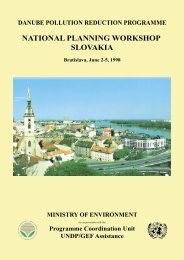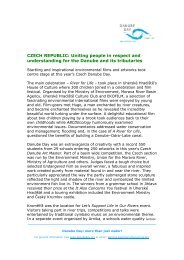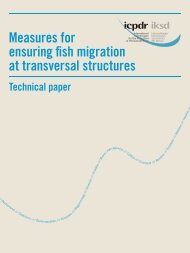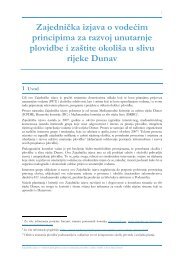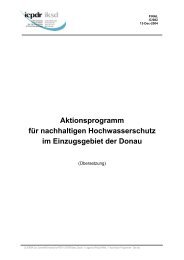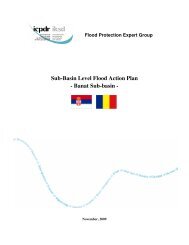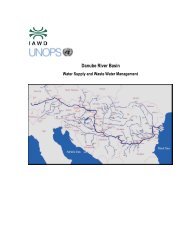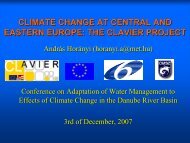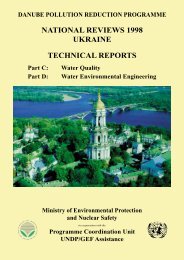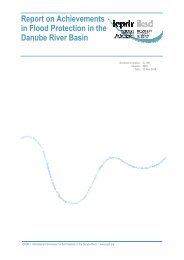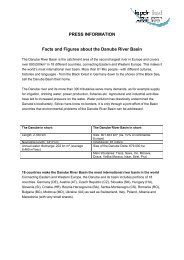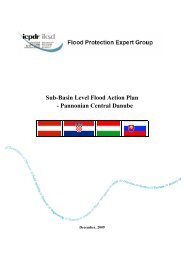Analysis of current national legislation on fertilizers, manure ... - ICPDR
Analysis of current national legislation on fertilizers, manure ... - ICPDR
Analysis of current national legislation on fertilizers, manure ... - ICPDR
Create successful ePaper yourself
Turn your PDF publications into a flip-book with our unique Google optimized e-Paper software.
August 2006<br />
REDUCTION OF POLLUTION RELEASES<br />
THROUGH AGRICULTURAL POLICY CHANGES<br />
AND DEMONSTRATION PROJECTS<br />
<str<strong>on</strong>g>Analysis</str<strong>on</strong>g> <str<strong>on</strong>g>of</str<strong>on</strong>g> <str<strong>on</strong>g>current</str<strong>on</strong>g> <str<strong>on</strong>g>nati<strong>on</strong>al</str<strong>on</strong>g> <str<strong>on</strong>g>legislati<strong>on</strong></str<strong>on</strong>g> about<br />
Fertilizers, Manure and Pesticides
AUTHORS<br />
PREPARED BY:<br />
Carl Bro and Danish Agricultural Advisory Service<br />
AUTHORS:<br />
Jens Skau<br />
Slobodan Milosevic<br />
Jesper Ansbaek<br />
Gisela Felkl<br />
With input from partners in:<br />
Croatia<br />
Bosnia & Herzegovina<br />
Serbia and M<strong>on</strong>tenegro<br />
Romania<br />
Bulgaria<br />
Ukraine<br />
Moldova<br />
Carl Bro a|s, Granskoven 8, 2600 Glostrup,<br />
Denmark
PREFACE<br />
This assignment is directed at strengthening the capacity <str<strong>on</strong>g>of</str<strong>on</strong>g> the Danube River Basin countries to<br />
develop new policies <strong>on</strong> agricultural polluti<strong>on</strong> preventi<strong>on</strong> and to validate these c<strong>on</strong>cepts through a<br />
pilot project. The work builds <strong>on</strong> earlier studies and aims at helping in improving the linkages<br />
between key EU policy instruments including the CAP, Water Framework Directive, Nitrates<br />
Directive and the Comm<strong>on</strong> Agricultural Policy etc., within the basin.<br />
This Project is a c<strong>on</strong>tinuati<strong>on</strong> <str<strong>on</strong>g>of</str<strong>on</strong>g> work in Phase 1 <str<strong>on</strong>g>of</str<strong>on</strong>g> the DRP, and the outputs and outcomes from<br />
this phase will be utilized and further developed in the project.<br />
The Project will assist the DRB countries (especially in the lower Danube basin) with the<br />
development <str<strong>on</strong>g>of</str<strong>on</strong>g> pilot programmes for agricultural polluti<strong>on</strong> reducti<strong>on</strong> and low-input agriculture, in<br />
line with existing and emerging (driven by EU Accessi<strong>on</strong>) <str<strong>on</strong>g>nati<strong>on</strong>al</str<strong>on</strong>g> envir<strong>on</strong>mental <str<strong>on</strong>g>legislati<strong>on</strong></str<strong>on</strong>g>.<br />
The project addresses two DRP Outputs:<br />
> Agricultural Policy (DRP Output 1.2) and<br />
> Pilot Projects (DRP Output 1.3)<br />
The following Tasks are included in the Project relating to Agricultural Policy:<br />
> Task 1: <str<strong>on</strong>g>Analysis</str<strong>on</strong>g> <str<strong>on</strong>g>of</str<strong>on</strong>g> Current Legislati<strong>on</strong> and Enforcement<br />
> Task 2: Review <str<strong>on</strong>g>of</str<strong>on</strong>g> Agrochemical Inventories<br />
> Task 3: Best Agricultural Practice<br />
> Task 4: Disseminati<strong>on</strong> <str<strong>on</strong>g>of</str<strong>on</strong>g> new Agricultural Polluti<strong>on</strong> Reducti<strong>on</strong> C<strong>on</strong>cepts<br />
The following Tasks are included in the Project relating to Pilot Projects:<br />
> Task 5: Preparing detailed work programme for Pilot Projects<br />
> Task 6: Implementing Agreed Pilot Project<br />
> Task 7: Pilot Project Training and Dem<strong>on</strong>strati<strong>on</strong> Workshops<br />
The present report <strong>on</strong> <str<strong>on</strong>g>Analysis</str<strong>on</strong>g> <str<strong>on</strong>g>of</str<strong>on</strong>g> <str<strong>on</strong>g>current</str<strong>on</strong>g> <str<strong>on</strong>g>nati<strong>on</strong>al</str<strong>on</strong>g> <str<strong>on</strong>g>legislati<strong>on</strong></str<strong>on</strong>g> about Fertilizers, Manure and<br />
Pesticides is an output <str<strong>on</strong>g>of</str<strong>on</strong>g> Task 1: <str<strong>on</strong>g>Analysis</str<strong>on</strong>g> <str<strong>on</strong>g>of</str<strong>on</strong>g> <str<strong>on</strong>g>current</str<strong>on</strong>g> Legislati<strong>on</strong> and Enforcement. The report<br />
c<strong>on</strong>tains an analysis <str<strong>on</strong>g>of</str<strong>on</strong>g> relevant <str<strong>on</strong>g>legislati<strong>on</strong></str<strong>on</strong>g>, existing policy programmes and the <str<strong>on</strong>g>current</str<strong>on</strong>g> state <str<strong>on</strong>g>of</str<strong>on</strong>g><br />
enforcement in the DRB countries based <strong>on</strong> the Project reports from the 7 project partners in the<br />
Lower DRB countries and other available informati<strong>on</strong>.<br />
The reports from the project partners in Croatia, Bosnia & Herzegovina, Serbia and M<strong>on</strong>tenegro,<br />
Romania, Bulgaria, Ukraine and Moldova are available as separate files.
<str<strong>on</strong>g>Analysis</str<strong>on</strong>g> <str<strong>on</strong>g>of</str<strong>on</strong>g> Current Nati<strong>on</strong>al Legislati<strong>on</strong> about Fertilizers, Manure and Pesticides<br />
page 5<br />
TABLE OF CONTENTS<br />
1. CONCLUSIONS................................................................................................... 7<br />
1.1 Gaps in Relati<strong>on</strong> to EU Comm<strong>on</strong> Agricultural Policy (CAP) and Expectati<strong>on</strong>s about EU<br />
Memberships ............................................................................................................. 7<br />
2. IMPACT OF AGRICULTURE ON THE ENVIRONMENT .................................................. 9<br />
3. PARTNER ORGANISATIONS.................................................................................. 9<br />
4. GENERAL CONSIDERATIONS................................................................................ 9<br />
5. LINK TO PHASE 1 DRP ACTIVITIES ......................................................................10<br />
6. STATUS IN THE 7 LOWER DRB COUNTRIES AND DRB EU MEMBER STATES ................11<br />
6.1 Group 1: Bulgaria and Romania .......................................................................11<br />
6.2 Group 2: Croatia, Bosnia and Herzegovina, Serbia and M<strong>on</strong>tenegro.......................12<br />
6.3 Group 3: Moldova and Ukraine ........................................................................13<br />
6.4 Group 4: Austria and Germany ........................................................................14<br />
6.5 Group 5: Czech Republic, Hungary, Slovak Republic, Slovenia..............................17<br />
7. EU – AND WORLD TRADE ...................................................................................20<br />
8. RECOMMENDATIONS .........................................................................................22<br />
8.1 Polluti<strong>on</strong> Preventi<strong>on</strong> Opportunities for the Agricultural Producti<strong>on</strong> <str<strong>on</strong>g>of</str<strong>on</strong>g> Field Crops and<br />
Husbandry in Lower DRB Countries ..............................................................................22<br />
8.2 Policy instruments .........................................................................................22<br />
8.3 Recommendati<strong>on</strong>s for BAP in the Lower DRB Countries .......................................23<br />
CARL BRO AND DAAS/ Jens Skau, Slobodan Milosevic, Jesper Ansbaek, Gisela Felkl
page 6<br />
LIST OF ABBREVIATIONS<br />
BAP<br />
B&H<br />
CAP<br />
CISTA<br />
DRB<br />
DRP<br />
DRPC<br />
ENP<br />
EU<br />
GAP<br />
GEF<br />
GFP<br />
GMO<br />
IACS<br />
IPPC<br />
ISPA<br />
PPP<br />
UNDP<br />
S&M<br />
SAPARD<br />
WB<br />
WTO<br />
Best Agricultural Practice<br />
Bosnia & Herzegovina<br />
Comm<strong>on</strong> Agricultural Policy<br />
Central Institute for Supervising and Testing in Agriculture , Czech Republic<br />
Danube River Basin<br />
Danube Regi<strong>on</strong>al Project<br />
Danube River Protecti<strong>on</strong> C<strong>on</strong>venti<strong>on</strong><br />
European Neighbouring Countries<br />
European Uni<strong>on</strong><br />
Good Agricultural Practice<br />
Global Envir<strong>on</strong>ment Facility<br />
Good Farming Practice<br />
Genetic Modified Organisms<br />
Integrated Accounting C<strong>on</strong>trol System<br />
Integrated Polluti<strong>on</strong> Preventi<strong>on</strong> and C<strong>on</strong>trol<br />
Instruments for Structural Policies for Pre-Accessi<strong>on</strong><br />
Plant Protecti<strong>on</strong> Products<br />
United Nati<strong>on</strong>s Development Programme<br />
Serbia & M<strong>on</strong>tenegro<br />
Special Pre-Accessi<strong>on</strong> Programme for Agriculture and Rural Development<br />
World Bank<br />
World Trade Organizati<strong>on</strong><br />
UNDP/GEF DANUBE REGIONAL PROJECT
<str<strong>on</strong>g>Analysis</str<strong>on</strong>g> <str<strong>on</strong>g>of</str<strong>on</strong>g> Current Nati<strong>on</strong>al Legislati<strong>on</strong> about Fertilizers, Manure and Pesticides<br />
page 7<br />
1. CONCLUSIONS<br />
Not surprisingly there are big differences am<strong>on</strong>g the 7 lower Danube countries and between them<br />
and EU member states. The <str<strong>on</strong>g>legislati<strong>on</strong></str<strong>on</strong>g> is different in all <str<strong>on</strong>g>of</str<strong>on</strong>g> the lower Danube 7 countries and they<br />
have not yet developed a clear agro-envir<strong>on</strong>mental strategy. All have received some technical<br />
assistance from different d<strong>on</strong>ors to establish a policy to encourage a comprehensive agroenvir<strong>on</strong>mental<br />
strategy and Bulgaria and Romania have reached a high level <str<strong>on</strong>g>of</str<strong>on</strong>g> provisi<strong>on</strong>s in<br />
comparis<strong>on</strong> with the EU acquis. However, it seems that there is a big gap between the provisi<strong>on</strong>s<br />
and the actual enforcement and c<strong>on</strong>trol in each country.<br />
The less<strong>on</strong>s learned in EU countries are that training, educati<strong>on</strong> <str<strong>on</strong>g>of</str<strong>on</strong>g> farmers, assistance from<br />
extensi<strong>on</strong> services, and awareness activities such as pilot projects are the most important tools for<br />
the implementati<strong>on</strong> <str<strong>on</strong>g>of</str<strong>on</strong>g> Best Agricultural Practise (BAP) and for reducing the envir<strong>on</strong>mental impact<br />
<str<strong>on</strong>g>of</str<strong>on</strong>g> agriculture. Visits to farmers who are practising BAP as well as training in the financial benefits<br />
<str<strong>on</strong>g>of</str<strong>on</strong>g> BAP for the farmers and the envir<strong>on</strong>mental impact <str<strong>on</strong>g>of</str<strong>on</strong>g> it <strong>on</strong> the society is the main key for the<br />
understanding <str<strong>on</strong>g>of</str<strong>on</strong>g> BAP.<br />
Notwithstanding maybe the most important tools reducing the envir<strong>on</strong>mental impact <str<strong>on</strong>g>of</str<strong>on</strong>g> agriculture<br />
are incentives through direct support to investments in e.g. storage facilities, spreading equipment,<br />
and a punishment system for producers who are not fulfilling the rules and provisi<strong>on</strong>s, like the<br />
cross-compliance <str<strong>on</strong>g>of</str<strong>on</strong>g> EU and/or other <str<strong>on</strong>g>nati<strong>on</strong>al</str<strong>on</strong>g> punishment systems for farmers.<br />
It is very important to support the formati<strong>on</strong> <str<strong>on</strong>g>of</str<strong>on</strong>g> machine rings, machine pools or other ways to<br />
organise a cost-efficient use <str<strong>on</strong>g>of</str<strong>on</strong>g> farm machines and equipment for handling, transport and<br />
spreading <str<strong>on</strong>g>of</str<strong>on</strong>g> livestock <strong>manure</strong>. Such equipment and machinery is typically too expensive to<br />
purchase and maintain for the single family farm. It is in this c<strong>on</strong>necti<strong>on</strong> important to promote and<br />
dem<strong>on</strong>strate the value <str<strong>on</strong>g>of</str<strong>on</strong>g> farmer cooperati<strong>on</strong>.<br />
Limited resources are available for inspecti<strong>on</strong> and enforcement in the 7 lower Danube countries,<br />
and focus should be <strong>on</strong> a positive dialogue with the agricultural society (incl. the farmers) focussing<br />
<strong>on</strong> the ec<strong>on</strong>omic and envir<strong>on</strong>mental benefits for each individual farm. Ec<strong>on</strong>omic incentives should<br />
be used support to investments in e.g. storage facilities, spreading equipment for <strong>manure</strong>.<br />
1.1. Gaps in Relati<strong>on</strong> to EU Comm<strong>on</strong> Agricultural Policy (CAP) and<br />
Expectati<strong>on</strong>s about EU Memberships<br />
N<strong>on</strong>e <str<strong>on</strong>g>of</str<strong>on</strong>g> the Lower Danube River Basin Countries are at the moment members <str<strong>on</strong>g>of</str<strong>on</strong>g> the EU and n<strong>on</strong>e<br />
<str<strong>on</strong>g>of</str<strong>on</strong>g> them have a <str<strong>on</strong>g>nati<strong>on</strong>al</str<strong>on</strong>g> agricultural policy in line with the quite complicated set <str<strong>on</strong>g>of</str<strong>on</strong>g> EU rules for the<br />
15 old members (EU15) as cross-compliance for direct support to farmers and the c<strong>on</strong>trol system<br />
as IACS. Romania and Bulgaria have established the Rural Development Programme (SAPARD) and<br />
other structural measures (e.g. ISPA) partly financed by EU as pre-membership development tools.<br />
The new EU members (EU10) have established a simple direct support system, except Slovenia.<br />
This simple direct support system is simpler than for the EU15 although it is quite complicated,<br />
especially regarding agro-envir<strong>on</strong>ment.<br />
CARL BRO AND DAAS/ Jens Skau, Slobodan Milosevic, Jesper Ansbaek, Gisela Felkl
page 8<br />
The old EU15 have introduced a number <str<strong>on</strong>g>of</str<strong>on</strong>g> regulati<strong>on</strong>s and provisi<strong>on</strong>s (IPPC, Nitrates Directives,<br />
Agrochemical Restricti<strong>on</strong>s etc.), which have to be enforced in all EU member countries (EU25),<br />
mainly by <str<strong>on</strong>g>nati<strong>on</strong>al</str<strong>on</strong>g> <str<strong>on</strong>g>legislati<strong>on</strong></str<strong>on</strong>g> and regulati<strong>on</strong>s. Some <str<strong>on</strong>g>of</str<strong>on</strong>g> the EU countries have more strict <str<strong>on</strong>g>nati<strong>on</strong>al</str<strong>on</strong>g><br />
provisi<strong>on</strong>s than others (which is allowed by the EU). As an example Denmark has <strong>on</strong>ly approved 83<br />
active agro-chemicals where the EU has approved more than 100. New and more envir<strong>on</strong>ment<br />
friendly active agro-chemicals are approved every year and old <strong>on</strong>es are aband<strong>on</strong>ed. Some EU<br />
countries have not finally revised their <str<strong>on</strong>g>legislati<strong>on</strong></str<strong>on</strong>g> in accordance with the EU’s latest envir<strong>on</strong>mental<br />
Directives and all provisi<strong>on</strong>s are therefore not enforced yet.<br />
In the past many years farmers in EU15 have invested a lot in envir<strong>on</strong>mentally friendly producti<strong>on</strong><br />
facilities and been trained in the handling <str<strong>on</strong>g>of</str<strong>on</strong>g> <strong>fertilizers</strong>, other agrochemicals and <strong>manure</strong> in the<br />
most envir<strong>on</strong>mentally safe way in order to reduce the agricultural impact <strong>on</strong> the surrounding<br />
society. The new 10 EU members are catching up <strong>on</strong> the above directives and regulati<strong>on</strong>s,<br />
notwithstanding that it is a l<strong>on</strong>g lasting process to reach the final enforcement and visible result <str<strong>on</strong>g>of</str<strong>on</strong>g><br />
the measures. At the same time all EU regulati<strong>on</strong>s are undergoing revisi<strong>on</strong>s as e.g. the new<br />
chemical product agreement <str<strong>on</strong>g>of</str<strong>on</strong>g> November 2005.<br />
Romania and Bulgaria are expected to become members <str<strong>on</strong>g>of</str<strong>on</strong>g> the EU in 2007. The latest<br />
Comprehensive M<strong>on</strong>itoring Report <str<strong>on</strong>g>of</str<strong>on</strong>g> 25 th October 2005 shows that the two countries still have<br />
some legislative work to adopt and to implement before membership and finally to fulfil the<br />
provisi<strong>on</strong>.<br />
Croatia will so<strong>on</strong> get extra technical and financial assistance for their preparati<strong>on</strong>s for EU<br />
membership and also financial support to a rural development programme (SAPARD). The<br />
assistance will assist them in meeting the EU’s legislative requirements in the agro-envir<strong>on</strong>mental<br />
field as well as in implementati<strong>on</strong> <str<strong>on</strong>g>of</str<strong>on</strong>g> the measures.<br />
Also B&H and S&M are <strong>on</strong> their way to become members <str<strong>on</strong>g>of</str<strong>on</strong>g> the EU. It is expected that the two<br />
countries can catch-up with Croatia over the coming years and will so<strong>on</strong> have the same technical<br />
and financial assistance as Croatia and also assistance from other multilateral and bilateral d<strong>on</strong>ors.<br />
There is no doubt that Moldova and Ukraine will benefit from the Neighbouring Programme <str<strong>on</strong>g>of</str<strong>on</strong>g> EU<br />
(ENP) and <strong>on</strong> other d<strong>on</strong>ors’ programmes (GEF, UNOPS, WB and bilateral d<strong>on</strong>ors) in the coming<br />
years and special effort will be d<strong>on</strong>e <strong>on</strong> programmes for diminishing the envir<strong>on</strong>mental impact from<br />
farming and agro-business. The assistance will be technical as well as financial.<br />
The process <str<strong>on</strong>g>of</str<strong>on</strong>g> diminishing the envir<strong>on</strong>mental impact <str<strong>on</strong>g>of</str<strong>on</strong>g> agricultural producti<strong>on</strong> <strong>on</strong> rivers, canals,<br />
lakes and ground water is progressing in the DRB in all the 7 lower DRB countries. The present<br />
UNOPS/GEF project will support the progress through the activities and results <str<strong>on</strong>g>of</str<strong>on</strong>g> the different<br />
tasks.<br />
As menti<strong>on</strong>ed the existing Comm<strong>on</strong> Agricultural Policy (CAP) including cross-compliance, agroenvir<strong>on</strong>ment<br />
and rural development measures <str<strong>on</strong>g>of</str<strong>on</strong>g> EU cannot just be transferred to other countries.<br />
The <str<strong>on</strong>g>nati<strong>on</strong>al</str<strong>on</strong>g> policy has to build <strong>on</strong> the existing policy and traditi<strong>on</strong>. The EU cross-compliance<br />
system cannot be used directly as an enforcement tool for agro-envir<strong>on</strong>ment measures in the lower<br />
Danube River Basin countries, because it is based <strong>on</strong> the direct payment system to producers. This<br />
system which is not applied in the 7 countries at the moment and will not be applied simply to<br />
introduce the cross-compliance system. Therefore an investment support system and a supervisi<strong>on</strong><br />
and c<strong>on</strong>trol system has to be developed to ensure the enforcement <str<strong>on</strong>g>of</str<strong>on</strong>g> policies reducing the<br />
polluti<strong>on</strong> <str<strong>on</strong>g>of</str<strong>on</strong>g> rivers and canals and to gain the desired effect <strong>on</strong> the envir<strong>on</strong>ment.<br />
UNDP/GEF DANUBE REGIONAL PROJECT
<str<strong>on</strong>g>Analysis</str<strong>on</strong>g> <str<strong>on</strong>g>of</str<strong>on</strong>g> Current Nati<strong>on</strong>al Legislati<strong>on</strong> about Fertilizers, Manure and Pesticides<br />
page 9<br />
2. IMPACT OF AGRICULTURE ON THE ENVIRONMENT<br />
This Project focuses <strong>on</strong> the impact <str<strong>on</strong>g>of</str<strong>on</strong>g> agriculture <strong>on</strong> the envir<strong>on</strong>ment from the use <str<strong>on</strong>g>of</str<strong>on</strong>g> <strong>fertilizers</strong>,<br />
handling <str<strong>on</strong>g>of</str<strong>on</strong>g> <strong>manure</strong> from husbandry, and pesticides. Other envir<strong>on</strong>mental impacts <str<strong>on</strong>g>of</str<strong>on</strong>g> agriculture<br />
e.g. impacts resulting from feeding <str<strong>on</strong>g>of</str<strong>on</strong>g> animals, use <str<strong>on</strong>g>of</str<strong>on</strong>g> medicine, field work, irrigati<strong>on</strong>, erosi<strong>on</strong>,<br />
changes in flow regime in rivers, solid waste and waste water from agriculture are not covered by<br />
the project. Outside the scope <str<strong>on</strong>g>of</str<strong>on</strong>g> the project is also the envir<strong>on</strong>mental impact <str<strong>on</strong>g>of</str<strong>on</strong>g> agro-services,<br />
abattoirs and food processing.<br />
3. PARTNER ORGANISATIONS<br />
The Partner Organisati<strong>on</strong>s in the 7 lower Danube countries<br />
1. Bosnia & Herzegovina: Agricultural Institute <str<strong>on</strong>g>of</str<strong>on</strong>g> Republic <str<strong>on</strong>g>of</str<strong>on</strong>g> Srpska, Department <str<strong>on</strong>g>of</str<strong>on</strong>g><br />
Agrochemistry and Agroecology.<br />
2. Bulgaria, Nati<strong>on</strong>al Agricultural Advisory Service<br />
3. Croatia, Regi<strong>on</strong>al Envir<strong>on</strong>mental Centre and EuroLex C<strong>on</strong>sulting Ltd.<br />
4. Moldova, NATIONAL FARMERS FEDERATION<br />
5. Romania, Fundatia pentru Dezvoltare Rurala din Romania<br />
6. Serbia and M<strong>on</strong>tenegro, “Natura Balkanika” Nature Society<br />
7. Ukraine, Nati<strong>on</strong>al Associati<strong>on</strong> <str<strong>on</strong>g>of</str<strong>on</strong>g> Agricultural Advisory Service <str<strong>on</strong>g>of</str<strong>on</strong>g> Ukraine<br />
has drafted a report for each country focussing <strong>on</strong> <str<strong>on</strong>g>legislati<strong>on</strong></str<strong>on</strong>g>, Annex 5-12, which has provided an<br />
important input to this report.<br />
4. GENERAL CONSIDERATIONS<br />
The average use <str<strong>on</strong>g>of</str<strong>on</strong>g> <strong>fertilizers</strong> and <str<strong>on</strong>g>of</str<strong>on</strong>g> agrochemicals per ha cultivated agricultural land in the lower<br />
DRB countries according to statistical informati<strong>on</strong> is today very much under the level <str<strong>on</strong>g>of</str<strong>on</strong>g> the old EU<br />
member states (EU15) in the DRB (Germany and Austria). New figures show a small increase in<br />
the total utilisati<strong>on</strong> <str<strong>on</strong>g>of</str<strong>on</strong>g> <strong>fertilizers</strong> and agrochemicals in the lower DRB countries in the latest years,<br />
and at the same time the area <str<strong>on</strong>g>of</str<strong>on</strong>g> cultivated agricultural land has been increased.<br />
The number <str<strong>on</strong>g>of</str<strong>on</strong>g> cattle, pigs and poultry has been reduced since the beginning <str<strong>on</strong>g>of</str<strong>on</strong>g> the 1990s and has<br />
resulted in a reduced quantity <str<strong>on</strong>g>of</str<strong>on</strong>g> <strong>manure</strong>.<br />
In socialist and communist time <str<strong>on</strong>g>of</str<strong>on</strong>g> the former communist countries the <strong>manure</strong> was not regarded<br />
as a valuable asset for fertilizing field crops but as a waste product and was wasted into lago<strong>on</strong>s or<br />
seeping into canals and rivers polluting the surroundings and the envir<strong>on</strong>ment. Today the problem<br />
still exists. Very few cattle, pigs or poultry farms in the lower Danube countries are storing,<br />
handling, using (as a source <str<strong>on</strong>g>of</str<strong>on</strong>g> nutrients for the crops) or selling the produced <strong>manure</strong> in an<br />
CARL BRO AND DAAS/ Jens Skau, Slobodan Milosevic, Jesper Ansbaek, Gisela Felkl
page 10<br />
optimal way to use the nutrients in the <strong>manure</strong> for crop producti<strong>on</strong> and to prevent polluti<strong>on</strong> <str<strong>on</strong>g>of</str<strong>on</strong>g> the<br />
envir<strong>on</strong>ment.<br />
Another challenge is to limit the use <str<strong>on</strong>g>of</str<strong>on</strong>g> pesticides in agriculture by improving their effectiveness.<br />
Many types <str<strong>on</strong>g>of</str<strong>on</strong>g> active ingredients in pesticides have been prohibited in the latest years in all the 7<br />
lower DRB countries. Some countries are close to having implemented the EU Agrochemicals<br />
Positive Inventory List, where others, e.g. Romania, have got a transiti<strong>on</strong>al period to outface<br />
chemicals that are prohibited in other EU countries (e.g. 2.4-D).<br />
Some <str<strong>on</strong>g>of</str<strong>on</strong>g> the countries still have (un<str<strong>on</strong>g>of</str<strong>on</strong>g>ficial) stocks <str<strong>on</strong>g>of</str<strong>on</strong>g> outdated agrochemicals, which are still used<br />
as pesticides. In some <str<strong>on</strong>g>of</str<strong>on</strong>g> the countries (e.g. Romania) it is allowed to use these and in others (e.g.<br />
Bulgaria) this is strictly prohibited.<br />
Many farmers are using outdated field sprayers and equipment with bad atomizati<strong>on</strong> and uneven<br />
spreading, and therefore with low effect <strong>on</strong> weeds, fungus and insects and unreas<strong>on</strong>ably high<br />
impact <strong>on</strong> the envir<strong>on</strong>ment <str<strong>on</strong>g>of</str<strong>on</strong>g> the sprayings.<br />
The analysis shows big differences am<strong>on</strong>g the 13 DRB countries with respect to the menti<strong>on</strong>ed<br />
matters.<br />
5. LINK TO PHASE 1 DRP ACTIVITIES<br />
This report builds <strong>on</strong> the achievements <str<strong>on</strong>g>of</str<strong>on</strong>g> Phase 1 <str<strong>on</strong>g>of</str<strong>on</strong>g> the Danube Regi<strong>on</strong>al Project, especially the<br />
reports:<br />
• Recommendati<strong>on</strong>s for Policy Reforms for the Introducti<strong>on</strong> <str<strong>on</strong>g>of</str<strong>on</strong>g> Best Agricultural Practice<br />
(BAP) in the Central and Lower Danube River Basin Countries.<br />
• Final Report for Danube Regi<strong>on</strong>al Project Outputs 1.2 & 1.3<br />
• Inventory <str<strong>on</strong>g>of</str<strong>on</strong>g> Policies for C<strong>on</strong>trol <str<strong>on</strong>g>of</str<strong>on</strong>g> Water Polluti<strong>on</strong> by Agriculture in the Central and Lower<br />
Danube River Countries<br />
It uses the same definiti<strong>on</strong> <str<strong>on</strong>g>of</str<strong>on</strong>g> Best Agricultural Practice as in Phase 1 <str<strong>on</strong>g>of</str<strong>on</strong>g> the Danube Regi<strong>on</strong>al<br />
Project: “…the highest level <str<strong>on</strong>g>of</str<strong>on</strong>g> polluti<strong>on</strong> c<strong>on</strong>trol practice that any farmer can reas<strong>on</strong>ably be<br />
expected to adopt when working within their own <str<strong>on</strong>g>nati<strong>on</strong>al</str<strong>on</strong>g>, regi<strong>on</strong>al and/or local c<strong>on</strong>text in the<br />
Danube River Basin”.<br />
Focus in Phase 1 was <strong>on</strong> the use <str<strong>on</strong>g>of</str<strong>on</strong>g> agrochemicals. This project c<strong>on</strong>siders the handling <str<strong>on</strong>g>of</str<strong>on</strong>g> <strong>manure</strong><br />
as a central issue in BAP implementati<strong>on</strong> in the lower Danube countries. This project will also<br />
promote the approach that introducti<strong>on</strong> <str<strong>on</strong>g>of</str<strong>on</strong>g> BAP will have positive effects <strong>on</strong> the envir<strong>on</strong>ment as well<br />
as <strong>on</strong> the farm producti<strong>on</strong> ec<strong>on</strong>omy.<br />
UNDP/GEF DANUBE REGIONAL PROJECT
<str<strong>on</strong>g>Analysis</str<strong>on</strong>g> <str<strong>on</strong>g>of</str<strong>on</strong>g> Current Nati<strong>on</strong>al Legislati<strong>on</strong> about Fertilizers, Manure and Pesticides<br />
page 11<br />
6. STATUS IN THE 7 LOWER DRB COUNTRIES AND DRB<br />
EU MEMBER STATES<br />
In relati<strong>on</strong> to EU the 7 lower DRB countries can be divided into three main groups; additi<strong>on</strong>ally two<br />
group <str<strong>on</strong>g>of</str<strong>on</strong>g> EU Member States is represented:<br />
1. Accessi<strong>on</strong> countries: Bulgaria and Romania.<br />
2. Applicant countries: Croatia, Bosnia and Herzegovina, Serbia and M<strong>on</strong>tenegro<br />
3. Other countries: Moldova and Ukraine.<br />
4. Old EU Member States (EU 15): Austria and Germany.<br />
5. New EU Member States (EU 10): Czech Republic, Hungary, Slovak Republic, Slovenia<br />
There are similarities between countries in the same group but there are also big differences,<br />
including the first group, which is <strong>on</strong> the doorstep to EU membership. The main reas<strong>on</strong> for the<br />
differences are the history, traditi<strong>on</strong>s, cultural differences, social differences, political will or lack <str<strong>on</strong>g>of</str<strong>on</strong>g><br />
understanding <str<strong>on</strong>g>of</str<strong>on</strong>g> the impact <str<strong>on</strong>g>of</str<strong>on</strong>g> polluti<strong>on</strong> <strong>on</strong> the surrounding envir<strong>on</strong>ment in general and therefore<br />
lack <str<strong>on</strong>g>of</str<strong>on</strong>g> understanding <str<strong>on</strong>g>of</str<strong>on</strong>g> the need to diminish the polluti<strong>on</strong> from agriculture and from agricultural<br />
activity. Some the lower DRB countries have adopted quite a number <str<strong>on</strong>g>of</str<strong>on</strong>g> laws in line with EU and<br />
inter<str<strong>on</strong>g>nati<strong>on</strong>al</str<strong>on</strong>g> standards, but there is a general lack <str<strong>on</strong>g>of</str<strong>on</strong>g> implementati<strong>on</strong> and enforcement in all the 7<br />
lower DRB countries.<br />
6.1. Group 1: Bulgaria and Romania<br />
Status in implementing the EU rules for the agricultural sector<br />
- <str<strong>on</strong>g>Analysis</str<strong>on</strong>g> <str<strong>on</strong>g>of</str<strong>on</strong>g> the relevant <str<strong>on</strong>g>legislati<strong>on</strong></str<strong>on</strong>g><br />
The first group c<strong>on</strong>sisting <str<strong>on</strong>g>of</str<strong>on</strong>g> Romania and Bulgaria are enforced to adopt and implement the EU<br />
acquis before EU membership. Romania has in the Accessi<strong>on</strong> Treaty got transiti<strong>on</strong> periods for<br />
several agro-envir<strong>on</strong>ment measures and restricti<strong>on</strong>s e.g. the transpositi<strong>on</strong> <str<strong>on</strong>g>of</str<strong>on</strong>g> some <str<strong>on</strong>g>of</str<strong>on</strong>g> the<br />
provisi<strong>on</strong>s in the agrochemical regulati<strong>on</strong>s, the Nitrates Directive related to vulnerable z<strong>on</strong>es, and<br />
about water quality and the IPPC regulati<strong>on</strong>, where Bulgaria has agreed to fulfil all provisi<strong>on</strong>s at the<br />
day <str<strong>on</strong>g>of</str<strong>on</strong>g> membership.<br />
- <str<strong>on</strong>g>Analysis</str<strong>on</strong>g> <str<strong>on</strong>g>of</str<strong>on</strong>g> existing policy programmes<br />
Both Romania and Bulgaria are especially benefiting from EU technical advisory project support<br />
(PHARE) to assist the two countries in the preparati<strong>on</strong> <str<strong>on</strong>g>of</str<strong>on</strong>g> <str<strong>on</strong>g>legislati<strong>on</strong></str<strong>on</strong>g> in line with EU, in gap analysis,<br />
road maps, educati<strong>on</strong> and training before membership, plus that EU by the SAPARD facility is<br />
supporting farmers financially to invest in agro-envir<strong>on</strong>mental measures like storage facilities for<br />
<strong>manure</strong> and spreading material, and support to extensi<strong>on</strong> services and training. Also the two<br />
countries have benefited from UNOPS and World Bank projects since the beginning <str<strong>on</strong>g>of</str<strong>on</strong>g> the 1990s.<br />
The reports from the project partners in Bulgaria and Romania (Annex 9 and 10) and also the EU<br />
Comprehensive M<strong>on</strong>itoring Report <str<strong>on</strong>g>of</str<strong>on</strong>g> 25 th October 2005<br />
(http://europa.eu.int/comm/enlargement/romania/key_documents.htm) found that Bulgaria <strong>on</strong><br />
agro-envir<strong>on</strong>ment and agrochemicals at the moment 1 is closer to fulfil the EU acquis than Romania.<br />
On the other hand Romania and Bulgaria are given direct support and credit lines to farmers, for<br />
1 It is an <strong>on</strong>going process at the moment<br />
CARL BRO AND DAAS/ Jens Skau, Slobodan Milosevic, Jesper Ansbaek, Gisela Felkl
page 12<br />
buying <strong>fertilizers</strong> and pesticides. According to EU <str<strong>on</strong>g>nati<strong>on</strong>al</str<strong>on</strong>g> aid rules, support to <strong>fertilizers</strong> and<br />
pesticides will not be accepted from the day <str<strong>on</strong>g>of</str<strong>on</strong>g> membership.<br />
Both countries have quality requirements to <strong>fertilizers</strong> and for other agrochemicals and both have<br />
requirements for labelling and instructi<strong>on</strong>s to users. Bulgaria has restricti<strong>on</strong>s regarding the use <str<strong>on</strong>g>of</str<strong>on</strong>g><br />
<strong>fertilizers</strong> (quantity/ha), and Romania <strong>on</strong>ly has recommendati<strong>on</strong>s at the moment and restricti<strong>on</strong>s<br />
for spreading in the winter period. Both countries have restricti<strong>on</strong>s for the use <str<strong>on</strong>g>of</str<strong>on</strong>g> <strong>fertilizers</strong>, <strong>manure</strong><br />
and pesticides near lakes, rivers and watercourses and in vulnerable z<strong>on</strong>es and areas. Bulgaria has<br />
set up requirements for storage facilities for <strong>fertilizers</strong> and some recommendati<strong>on</strong>s. Romania <strong>on</strong>ly<br />
has recommendati<strong>on</strong>s.<br />
For solid and liquid <strong>manure</strong> Romania and Bulgaria have no requirements to quality checks but<br />
requirements and recommendati<strong>on</strong>s for storing and spreading. It seems that some primary<br />
<str<strong>on</strong>g>legislati<strong>on</strong></str<strong>on</strong>g> is missing, although Bulgaria has restricti<strong>on</strong>s in spreading <str<strong>on</strong>g>of</str<strong>on</strong>g> <strong>manure</strong> from November to<br />
February and the <strong>manure</strong> has to be ploughed or mixed into the soil within 4 days. The enforcement<br />
<str<strong>on</strong>g>of</str<strong>on</strong>g> the adopted provisi<strong>on</strong>s and supervisi<strong>on</strong> is unclear.<br />
- <str<strong>on</strong>g>Analysis</str<strong>on</strong>g> <str<strong>on</strong>g>of</str<strong>on</strong>g> the <str<strong>on</strong>g>current</str<strong>on</strong>g> state <str<strong>on</strong>g>of</str<strong>on</strong>g> enforcement<br />
As menti<strong>on</strong>ed above, Romania has in the Accessi<strong>on</strong> Treaty got a transiti<strong>on</strong>al period for some active<br />
agrochemical ingredients (2,4-D), and for some <str<strong>on</strong>g>of</str<strong>on</strong>g> the provisi<strong>on</strong>s in other directives as e.g .the<br />
Nitrate Directives.<br />
6.2. Group 2: Croatia, Bosnia and Herzegovina, Serbia and<br />
M<strong>on</strong>tenegro<br />
Status in implementing the EU rules for the agricultural sector<br />
-<str<strong>on</strong>g>Analysis</str<strong>on</strong>g> <str<strong>on</strong>g>of</str<strong>on</strong>g> the relevant <str<strong>on</strong>g>legislati<strong>on</strong></str<strong>on</strong>g><br />
There are also differences between the 3 countries in group 2, although it is not possible to assess<br />
who is in fr<strong>on</strong>t in relati<strong>on</strong> to the EU acquis for the agricultural sector, based al<strong>on</strong>e <strong>on</strong> the reports<br />
from partners and other available informati<strong>on</strong>. The three countries have got and are getting<br />
assistance from inter<str<strong>on</strong>g>nati<strong>on</strong>al</str<strong>on</strong>g> experts to develop and implement fertilizer <str<strong>on</strong>g>legislati<strong>on</strong></str<strong>on</strong>g> and for<br />
agrochemical inventories in line with inter<str<strong>on</strong>g>nati<strong>on</strong>al</str<strong>on</strong>g> standards (EU Nitrates Directives, IPPC<br />
Directives, agrochemicals). The <str<strong>on</strong>g>legislati<strong>on</strong></str<strong>on</strong>g> has to be adopted by legislators (Parliaments and<br />
Ministries) in the respective countries. Based <strong>on</strong> experiences this is a l<strong>on</strong>g-standing process.<br />
- <str<strong>on</strong>g>Analysis</str<strong>on</strong>g> <str<strong>on</strong>g>of</str<strong>on</strong>g> existing policy programmes<br />
All three countries have quality requirements to <strong>fertilizers</strong> and other agrochemicals, labelling and<br />
instructi<strong>on</strong>s to users. All have restricti<strong>on</strong>s in the use <str<strong>on</strong>g>of</str<strong>on</strong>g> <strong>fertilizers</strong>, but <strong>on</strong>ly laid down in the primary<br />
<str<strong>on</strong>g>legislati<strong>on</strong></str<strong>on</strong>g>. Croatia and Bosnia & Herzegovina (B&H) has in the primary <str<strong>on</strong>g>legislati<strong>on</strong></str<strong>on</strong>g> remarks about<br />
Good Agricultural Practise (GAP), but yet no clear descripti<strong>on</strong> <str<strong>on</strong>g>of</str<strong>on</strong>g> GAP and lack <str<strong>on</strong>g>of</str<strong>on</strong>g> sec<strong>on</strong>dary<br />
<str<strong>on</strong>g>legislati<strong>on</strong></str<strong>on</strong>g> or other recommendati<strong>on</strong>s. Serbia & M<strong>on</strong>tenegro (S&M) has some obligati<strong>on</strong>s in relati<strong>on</strong><br />
to a systematic soil fertility c<strong>on</strong>trol under way in the draft Law <strong>on</strong> Plant Nutrient.<br />
All three countries have restricti<strong>on</strong>s for the use <str<strong>on</strong>g>of</str<strong>on</strong>g> <strong>fertilizers</strong> near lakes, rivers and watercourses but<br />
not for vulnerable z<strong>on</strong>es.<br />
Croatia has rules for storing <strong>fertilizers</strong>, S&M <strong>on</strong>ly has this in a draft law, and according to the<br />
<str<strong>on</strong>g>nati<strong>on</strong>al</str<strong>on</strong>g> report B&H still has not made any progress in this field.<br />
UNDP/GEF DANUBE REGIONAL PROJECT
<str<strong>on</strong>g>Analysis</str<strong>on</strong>g> <str<strong>on</strong>g>of</str<strong>on</strong>g> Current Nati<strong>on</strong>al Legislati<strong>on</strong> about Fertilizers, Manure and Pesticides<br />
page 13<br />
N<strong>on</strong>e <str<strong>on</strong>g>of</str<strong>on</strong>g> the 3 countries have requirements for storing liquid or solid <strong>manure</strong>, except that S&M has<br />
some requirements to avoid water polluti<strong>on</strong> and infiltrati<strong>on</strong> into the soil. Only S&M has<br />
requirements for storing capacity <str<strong>on</strong>g>of</str<strong>on</strong>g> <strong>manure</strong> <str<strong>on</strong>g>of</str<strong>on</strong>g> at least 1 year and some recommendati<strong>on</strong>s related<br />
to spreading <str<strong>on</strong>g>of</str<strong>on</strong>g> <strong>manure</strong> in growing seas<strong>on</strong> and to plough it into the soil as so<strong>on</strong> as possible. The<br />
two other countries d<strong>on</strong>’t have any regulati<strong>on</strong>s or recommendati<strong>on</strong>s.<br />
All three countries have some restricti<strong>on</strong>s and requirements for using <strong>manure</strong> and agrochemicals in<br />
protected z<strong>on</strong>es al<strong>on</strong>g lakes, rivers and watercourses but nothing for vulnerable areas. Croatia and<br />
S&M are supporting financially investments in storage capacity <str<strong>on</strong>g>of</str<strong>on</strong>g> animal <strong>manure</strong>. For producers in<br />
B&H there are no possibilities for obtaining support in 2005 and probably neither in 2006, although<br />
the farmers are receiving direct producti<strong>on</strong> support. Serbia has established a Fund for<br />
Envir<strong>on</strong>mental Protecti<strong>on</strong> in 2005, which in the future could support agro-envir<strong>on</strong>mental measures.<br />
- <str<strong>on</strong>g>Analysis</str<strong>on</strong>g> <str<strong>on</strong>g>of</str<strong>on</strong>g> the <str<strong>on</strong>g>current</str<strong>on</strong>g> state <str<strong>on</strong>g>of</str<strong>on</strong>g> enforcement<br />
The enforcement <str<strong>on</strong>g>of</str<strong>on</strong>g> the existing policy seems lacking behind schedule in all the three countries.<br />
6.3. Group 3: Moldova and Ukraine<br />
Status in implementing the EU rules for the agricultural sector<br />
- <str<strong>on</strong>g>Analysis</str<strong>on</strong>g> <str<strong>on</strong>g>of</str<strong>on</strong>g> the relevant <str<strong>on</strong>g>legislati<strong>on</strong></str<strong>on</strong>g><br />
These two countries have regulati<strong>on</strong>s and provisi<strong>on</strong>s regarding quality requirements to <strong>fertilizers</strong><br />
and agrochemicals and also regarding labelling and instructi<strong>on</strong>s to users.<br />
Ukraine has restricti<strong>on</strong>s <strong>on</strong> the use <str<strong>on</strong>g>of</str<strong>on</strong>g> <strong>fertilizers</strong> per ha <str<strong>on</strong>g>of</str<strong>on</strong>g> agricultural land and Moldova <strong>on</strong>ly has<br />
regulati<strong>on</strong>s in the primary <str<strong>on</strong>g>legislati<strong>on</strong></str<strong>on</strong>g> and recommendati<strong>on</strong>s to avoid overdosing <str<strong>on</strong>g>of</str<strong>on</strong>g> different crops.<br />
Both countries have established vulnerable areas and border z<strong>on</strong>es around lakes, rivers and<br />
watercourses and some provisi<strong>on</strong>s to avoid polluti<strong>on</strong> from <strong>fertilizers</strong> and agrochemicals. There are<br />
no limits in the period <str<strong>on</strong>g>of</str<strong>on</strong>g> vegetati<strong>on</strong>, except that Ukraine has restricti<strong>on</strong>s for spreading <strong>fertilizers</strong> <strong>on</strong><br />
frozen and wet melted soil in winter.<br />
Ukraine has provisi<strong>on</strong>s for stocking and handling <strong>fertilizers</strong> where Moldova according to the <str<strong>on</strong>g>nati<strong>on</strong>al</str<strong>on</strong>g><br />
report has no rules.<br />
N<strong>on</strong>e <str<strong>on</strong>g>of</str<strong>on</strong>g> the two countries have rules for checking <str<strong>on</strong>g>of</str<strong>on</strong>g> the c<strong>on</strong>tents <str<strong>on</strong>g>of</str<strong>on</strong>g> nutrients in <strong>manure</strong> and <strong>on</strong>ly<br />
Ukraine has requirements regarding storing capacity <str<strong>on</strong>g>of</str<strong>on</strong>g> animal <strong>manure</strong> <str<strong>on</strong>g>of</str<strong>on</strong>g> at least 4 m<strong>on</strong>ths for<br />
solid <strong>manure</strong> and 6 m<strong>on</strong>ths for liquid <strong>manure</strong>. Ukraine has recommendati<strong>on</strong>s for allowing spreading<br />
<str<strong>on</strong>g>of</str<strong>on</strong>g> <strong>manure</strong> between 15 th March and 15 th October and not <strong>on</strong> frozen soil. For liquid <strong>manure</strong> it is in<br />
autumn <strong>on</strong>ly allowed to bring it out <strong>on</strong> crops and there are rules for mixing it into the soil. Moldova<br />
has at the moment no rules.<br />
Both counties have established provisi<strong>on</strong>s for the use <str<strong>on</strong>g>of</str<strong>on</strong>g> <strong>manure</strong> and agrochemicals in border z<strong>on</strong>es<br />
<str<strong>on</strong>g>of</str<strong>on</strong>g> lakes, watercourses, and vulnerable areas.<br />
- <str<strong>on</strong>g>Analysis</str<strong>on</strong>g> <str<strong>on</strong>g>of</str<strong>on</strong>g> existing policy programmes<br />
It is possible to get subsidies for investments in agro-envir<strong>on</strong>mental measures such as storage<br />
capacity for <strong>manure</strong> and machinery. Moldova has a special support scheme to machine-rings<br />
(groups <str<strong>on</strong>g>of</str<strong>on</strong>g> farmers) to buy agricultural machines. Both countries are supporting renovati<strong>on</strong> and<br />
improvements <str<strong>on</strong>g>of</str<strong>on</strong>g> drainage and canals and Ukraine also for improvements <str<strong>on</strong>g>of</str<strong>on</strong>g> irrigati<strong>on</strong> systems.<br />
CARL BRO AND DAAS/ Jens Skau, Slobodan Milosevic, Jesper Ansbaek, Gisela Felkl
page 14<br />
Ukraine is supporting producers buying <strong>fertilizers</strong> and pesticides by credit schemes.<br />
Ukraine has a governmental programme for financing soil calcificati<strong>on</strong> to increase the pH value,<br />
and Moldova has a financial support programme for <strong>manure</strong> storage facility financed by World Bank<br />
and GEF.<br />
- <str<strong>on</strong>g>Analysis</str<strong>on</strong>g> <str<strong>on</strong>g>of</str<strong>on</strong>g> the <str<strong>on</strong>g>current</str<strong>on</strong>g> state <str<strong>on</strong>g>of</str<strong>on</strong>g> enforcement<br />
The enforcement <str<strong>on</strong>g>of</str<strong>on</strong>g> the existing policy seems lacking behind schedule in the two countries<br />
6.4. Group 4: Austria and Germany<br />
Status in implementing the EU rules for the agricultural sector<br />
- <str<strong>on</strong>g>Analysis</str<strong>on</strong>g> <str<strong>on</strong>g>of</str<strong>on</strong>g> the relevant <str<strong>on</strong>g>legislati<strong>on</strong></str<strong>on</strong>g><br />
Both EU Member States, Austria and Germany, have transposed the EU Directive 91/676/EEC<br />
c<strong>on</strong>cerning the protecti<strong>on</strong> against polluti<strong>on</strong> caused by nitrates from agricultural sources (Nitrate<br />
Directive) into their <str<strong>on</strong>g>nati<strong>on</strong>al</str<strong>on</strong>g> laws. Austria has amended its Water Law with relevant <str<strong>on</strong>g>legislati<strong>on</strong></str<strong>on</strong>g>.<br />
Germany incorporated EU rules against water polluti<strong>on</strong> (Nitrate Directive and Water Framework<br />
Directive 2000/60/EC) in several statutes and regulati<strong>on</strong>s for water protecti<strong>on</strong> <strong>on</strong> <str<strong>on</strong>g>nati<strong>on</strong>al</str<strong>on</strong>g> and<br />
federal level. The German Use <str<strong>on</strong>g>of</str<strong>on</strong>g> Fertiliser Ordinance includes the Ordinance <strong>on</strong> Principals <str<strong>on</strong>g>of</str<strong>on</strong>g> Good<br />
Agricultural Practice and serves to implement the EU Nitrate Directive. Limit values for substances<br />
harmful to health like nitrates and plant protecti<strong>on</strong> products are laid down in the Drinking Water<br />
Ordinance, which also serves to implement the EU Drinking Water Directive in Germany.<br />
EU <str<strong>on</strong>g>legislati<strong>on</strong></str<strong>on</strong>g> regarding registrati<strong>on</strong>, distributi<strong>on</strong>, handling and use <str<strong>on</strong>g>of</str<strong>on</strong>g> plant protecti<strong>on</strong> products<br />
(PPPs) is mainly regulated by the EU Pesticide Directive 91/414/EEC and the more recent EU Water<br />
Framework Directive 2000/60/EC. Austria as well as Germany have transposed EU <str<strong>on</strong>g>legislati<strong>on</strong></str<strong>on</strong>g><br />
regarding agricultural plant protecti<strong>on</strong> products into their <str<strong>on</strong>g>nati<strong>on</strong>al</str<strong>on</strong>g> laws. The Austrian Federal<br />
Pois<strong>on</strong> Ordinance and Plant Protecti<strong>on</strong> Products Law for Agriculture and the German Plant<br />
Protecti<strong>on</strong> Law regulate all issues regarding registrati<strong>on</strong>, distributing, handling and use <str<strong>on</strong>g>of</str<strong>on</strong>g> plant<br />
protecti<strong>on</strong> products in agriculture and are amended with rules in line with the respective EU<br />
Directives.<br />
- <str<strong>on</strong>g>Analysis</str<strong>on</strong>g> <str<strong>on</strong>g>of</str<strong>on</strong>g> existing policy programmes<br />
Both Austria and Germany have designated the whole <str<strong>on</strong>g>nati<strong>on</strong>al</str<strong>on</strong>g> territory as vulnerable to nitrate<br />
polluti<strong>on</strong> and have established an Acti<strong>on</strong> Program in line with the Nitrate Directive. While some<br />
other EU Member States have opted to use livestock units, Austria and Germany have set the limit<br />
for applicati<strong>on</strong> <str<strong>on</strong>g>of</str<strong>on</strong>g> <strong>manure</strong> to 170 kg Nitrogen/ha/year in line with the Nitrates Directive.<br />
The Nitrates Directive Acti<strong>on</strong> Programmes include provisi<strong>on</strong>s <strong>on</strong> periods when applicati<strong>on</strong> <str<strong>on</strong>g>of</str<strong>on</strong>g><br />
fertiliser and <strong>manure</strong> is prohibited, prescribe a maximum limit <str<strong>on</strong>g>of</str<strong>on</strong>g> organic <strong>manure</strong> per hectare,<br />
specify good spreading practices and procedures for land applicati<strong>on</strong>. The Acti<strong>on</strong> Programmes<br />
further command minimum capacities and c<strong>on</strong>structi<strong>on</strong> requirements for <strong>manure</strong> storage, as well<br />
as mandatory fertiliser plans, soil analysis and record keeping <strong>on</strong> nutrient input and output <strong>on</strong> farm<br />
level. The implementati<strong>on</strong> <str<strong>on</strong>g>of</str<strong>on</strong>g> mandatory issues is regularly c<strong>on</strong>trolled by relevant government<br />
authorities. Both countries have quality requirements for fertilisers and other agrochemicals and<br />
both have requirements for labelling and instructi<strong>on</strong>s to users.<br />
UNDP/GEF DANUBE REGIONAL PROJECT
<str<strong>on</strong>g>Analysis</str<strong>on</strong>g> <str<strong>on</strong>g>of</str<strong>on</strong>g> Current Nati<strong>on</strong>al Legislati<strong>on</strong> about Fertilizers, Manure and Pesticides<br />
page 15<br />
According to Austrian and German laws and regulati<strong>on</strong>s all plant protecti<strong>on</strong> products used and<br />
distributed in agriculture have to be authorized by the relevant government authority. Only PPPs<br />
listed in a joint EU positive list can obtain authorisati<strong>on</strong>. PPPs authorised in other (EU) countries<br />
may not be sold or used in Austria and Germany, as authorisati<strong>on</strong> <str<strong>on</strong>g>of</str<strong>on</strong>g> PPPs is <str<strong>on</strong>g>nati<strong>on</strong>al</str<strong>on</strong>g> law.<br />
Excepti<strong>on</strong>s can be made in the case <str<strong>on</strong>g>of</str<strong>on</strong>g> so called parallel imports <str<strong>on</strong>g>of</str<strong>on</strong>g> pesticides with identical active<br />
ingredients as PPPs authorised in Austria and Germany. It is a requirement in Austria and Germany<br />
that PPPs may <strong>on</strong>ly be used in accordance with Good Agricultural Practice, which includes choice <str<strong>on</strong>g>of</str<strong>on</strong>g><br />
an appropriate pesticide, avoidance <str<strong>on</strong>g>of</str<strong>on</strong>g> excessive use <str<strong>on</strong>g>of</str<strong>on</strong>g> pesticides, use <str<strong>on</strong>g>of</str<strong>on</strong>g> adequately functi<strong>on</strong>ing<br />
and safe applicati<strong>on</strong> equipment, appropriate disposal <str<strong>on</strong>g>of</str<strong>on</strong>g> left over pesticides and cleaning <str<strong>on</strong>g>of</str<strong>on</strong>g><br />
equipment and appropriate storage <str<strong>on</strong>g>of</str<strong>on</strong>g> PPPs. PPPs may not be used near rivers and lakes and in<br />
specially defined water protecti<strong>on</strong> areas.<br />
- <str<strong>on</strong>g>Analysis</str<strong>on</strong>g> <str<strong>on</strong>g>of</str<strong>on</strong>g> the <str<strong>on</strong>g>current</str<strong>on</strong>g> state <str<strong>on</strong>g>of</str<strong>on</strong>g> enforcement<br />
M<strong>on</strong>itoring <str<strong>on</strong>g>of</str<strong>on</strong>g> the effectiveness <str<strong>on</strong>g>of</str<strong>on</strong>g> the Nitrate Directive Acti<strong>on</strong> Programme is in Austria d<strong>on</strong>e by<br />
m<strong>on</strong>itoring <str<strong>on</strong>g>of</str<strong>on</strong>g> changes in farming practices through fertilisati<strong>on</strong> statistics and livestock figures. To<br />
measure the nitrate c<strong>on</strong>tent <str<strong>on</strong>g>of</str<strong>on</strong>g> waters Austria and Germany have established a <str<strong>on</strong>g>nati<strong>on</strong>al</str<strong>on</strong>g> m<strong>on</strong>itoring<br />
scheme with a number <str<strong>on</strong>g>of</str<strong>on</strong>g> measuring points for surface water and ground water polluti<strong>on</strong>.<br />
In Austria the resp<strong>on</strong>sibility for reporting under the Nitrate Directive lies with the Water Directorate<br />
at the Ministry for Agriculture and Forestry, Envir<strong>on</strong>ment and Water Management. On district level<br />
the Acti<strong>on</strong> Programme is c<strong>on</strong>trolled by Water Inspectorates. Many Austrian farmers make use <str<strong>on</strong>g>of</str<strong>on</strong>g> a<br />
rural development programme and benefit from subsidies when complying with the standards <str<strong>on</strong>g>of</str<strong>on</strong>g><br />
the Acti<strong>on</strong> Programme. Public awareness activities in c<strong>on</strong>necti<strong>on</strong> with the Acti<strong>on</strong> Programme have<br />
been undertaken in Austria and a system <str<strong>on</strong>g>of</str<strong>on</strong>g> farmers´ training <strong>on</strong> how to comply with the rules has<br />
been established.<br />
In Germany all waters, including groundwater and coastal waters, are subject to state c<strong>on</strong>trol. All<br />
uses <str<strong>on</strong>g>of</str<strong>on</strong>g> water, also discharge <str<strong>on</strong>g>of</str<strong>on</strong>g> substances or removal <str<strong>on</strong>g>of</str<strong>on</strong>g> water are, in principle, subject to <str<strong>on</strong>g>of</str<strong>on</strong>g>ficial<br />
authorisati<strong>on</strong>. The resp<strong>on</strong>sibility for the implementati<strong>on</strong> <str<strong>on</strong>g>of</str<strong>on</strong>g> the policies derived from the Nitrate<br />
Directive lies with several Federal Agencies and the Water Authorities.<br />
Austria and Germany have transposed the Nitrate Directive, set up a m<strong>on</strong>itoring network, drawn up<br />
a code <str<strong>on</strong>g>of</str<strong>on</strong>g> good agricultural practice and designated vulnerable z<strong>on</strong>es. Authorisati<strong>on</strong> for PPPs is in<br />
Austria given by the Austrian Agency for Health and Food Safety, in Germany by the Federal Office<br />
<str<strong>on</strong>g>of</str<strong>on</strong>g> C<strong>on</strong>sumer Protecti<strong>on</strong> and Food Safety. During the registrati<strong>on</strong> process, PPPs are evaluated with<br />
regard to effects <strong>on</strong> crop protecti<strong>on</strong> and unacceptable effects <strong>on</strong> the envir<strong>on</strong>ment. The<br />
authorisati<strong>on</strong> is limited to certain crop situati<strong>on</strong>s and to certain pests. PPPs categorised as very<br />
pois<strong>on</strong>ous (T+) or pois<strong>on</strong>ous (T) can <strong>on</strong>ly be bought with an <str<strong>on</strong>g>of</str<strong>on</strong>g>ficial prescripti<strong>on</strong>/license in Austria.<br />
In Germany an <str<strong>on</strong>g>of</str<strong>on</strong>g>ficial prescripti<strong>on</strong>/license is mandatory for purchase <str<strong>on</strong>g>of</str<strong>on</strong>g> Glyphosate and Diur<strong>on</strong><br />
c<strong>on</strong>taining pesticides for use <strong>on</strong> n<strong>on</strong> agricultural areas.<br />
Good Agricultural Practice with regard to PPPs is enforced in Germany by requiring a special plant<br />
protecti<strong>on</strong> certificate from all pers<strong>on</strong>s using or distributing PPPs. To obtain a license the applicant<br />
has to prove knowledge <strong>on</strong> legal aspects <str<strong>on</strong>g>of</str<strong>on</strong>g> plant protecti<strong>on</strong>, the principles <str<strong>on</strong>g>of</str<strong>on</strong>g> Good Agricultural<br />
Practice and Integrated Pest Management, effects <str<strong>on</strong>g>of</str<strong>on</strong>g> PPPs, biology <str<strong>on</strong>g>of</str<strong>on</strong>g> pests, appropriate storage<br />
and transportati<strong>on</strong> <str<strong>on</strong>g>of</str<strong>on</strong>g> PPPs, safety measurements for users, avoidance <str<strong>on</strong>g>of</str<strong>on</strong>g> detrimental effects <strong>on</strong> the<br />
envir<strong>on</strong>ment and appropriate technical equipment for pesticide applicati<strong>on</strong>. A similar certificati<strong>on</strong> is<br />
requested in Austria from pers<strong>on</strong>s applying for a license for PPPs categorised as very toxic (T+) or<br />
toxic (T).<br />
Nati<strong>on</strong>al law in Austria and Germany provides for special rules for storage <str<strong>on</strong>g>of</str<strong>on</strong>g> PPPs categorised as<br />
very toxic (T+), toxic (T) or harmful (Xn). Quantities <str<strong>on</strong>g>of</str<strong>on</strong>g> up to 100 kg or 100 l have to be stored in<br />
CARL BRO AND DAAS/ Jens Skau, Slobodan Milosevic, Jesper Ansbaek, Gisela Felkl
page 16<br />
special metal cabinets; quantities exceeding this limit have to be stored in specially designed<br />
rooms. In both cases the facilities should be lockable, fire safe, air circulated and leakage<br />
protected.<br />
Spraying equipment for pesticide applicati<strong>on</strong> has in both Austria and Germany to undergo regular<br />
inspecti<strong>on</strong>s by accredited inspecti<strong>on</strong> work shops. Requirements include the appropriate functi<strong>on</strong>ing<br />
<str<strong>on</strong>g>of</str<strong>on</strong>g> the equipment, drift avoidance devices and the possibility to completely empty the tank. In both<br />
countries compliance with the rules regarding PPPs is regularly c<strong>on</strong>trolled by government<br />
authorities and any n<strong>on</strong> compliance is punished with penalties or exclusi<strong>on</strong> from rural development<br />
programmes.<br />
Compliance with Good Agricultural Practice regarding fertiliser storage and applicati<strong>on</strong> and<br />
applicati<strong>on</strong> and distributi<strong>on</strong> <str<strong>on</strong>g>of</str<strong>on</strong>g> PPPs is in Germany ensured by a complex c<strong>on</strong>trol system under the<br />
umbrella <str<strong>on</strong>g>of</str<strong>on</strong>g> the Ministry for Food, Forestry and Fisheries. Executing authorities for all issues<br />
regarding distributi<strong>on</strong> and applicati<strong>on</strong> <str<strong>on</strong>g>of</str<strong>on</strong>g> PPPs are the Regi<strong>on</strong>al Plant Protecti<strong>on</strong> Offices. Executing<br />
authorities for all issues regarding applicati<strong>on</strong> and storage <str<strong>on</strong>g>of</str<strong>on</strong>g> fertilisers <strong>on</strong> farm level are the<br />
Regi<strong>on</strong>al Agricultural Offices. C<strong>on</strong>trolling the distributi<strong>on</strong> <str<strong>on</strong>g>of</str<strong>on</strong>g> fertilisers and advising <strong>on</strong> good<br />
pr<str<strong>on</strong>g>of</str<strong>on</strong>g>essi<strong>on</strong>al practice in relati<strong>on</strong> to fertiliser use is the resp<strong>on</strong>sibility <str<strong>on</strong>g>of</str<strong>on</strong>g> the Agricultural Investigati<strong>on</strong><br />
and Research Instituti<strong>on</strong>s <str<strong>on</strong>g>of</str<strong>on</strong>g> the Federal States. Machinery for the applicati<strong>on</strong> <str<strong>on</strong>g>of</str<strong>on</strong>g> sprayable plant<br />
protecti<strong>on</strong> products have to be technically inspected every other year by accredited inspecti<strong>on</strong> work<br />
shops. Machinery that has passed testing receives an <str<strong>on</strong>g>of</str<strong>on</strong>g>ficial stamp similar to the <strong>on</strong>e for cars.<br />
The <str<strong>on</strong>g>of</str<strong>on</strong>g>ficial German inspecti<strong>on</strong> system is based <strong>on</strong> 3 levels <str<strong>on</strong>g>of</str<strong>on</strong>g> c<strong>on</strong>trol by <str<strong>on</strong>g>of</str<strong>on</strong>g>ficial inspectors <str<strong>on</strong>g>of</str<strong>on</strong>g> the<br />
respective authorities: (1) announced farm visits, (2) unannounced farm visits and (3) visits based<br />
<strong>on</strong> suspici<strong>on</strong> <str<strong>on</strong>g>of</str<strong>on</strong>g> n<strong>on</strong>-compliance. On such inspecti<strong>on</strong> visits the technical certificates for farm<br />
machinery, storage facilities for fertiliser and PPPs, stocks <str<strong>on</strong>g>of</str<strong>on</strong>g> agrochemicals, record keeping <str<strong>on</strong>g>of</str<strong>on</strong>g> farm<br />
inputs and outputs, need based fertiliser calculati<strong>on</strong> and the plant protecti<strong>on</strong> certificate <str<strong>on</strong>g>of</str<strong>on</strong>g> farmers<br />
and distributors are checked. The number <str<strong>on</strong>g>of</str<strong>on</strong>g> annual farm or distributor inspecti<strong>on</strong>s varies between<br />
the different Federal States <str<strong>on</strong>g>of</str<strong>on</strong>g> Germany. In the past years inspecti<strong>on</strong>s <strong>on</strong> fertiliser use for example<br />
in the Federal State <str<strong>on</strong>g>of</str<strong>on</strong>g> Mecklenburg Vorpommern have been about 250 annually, <strong>on</strong> fertiliser<br />
calculati<strong>on</strong> about 550, <strong>on</strong> record keeping <str<strong>on</strong>g>of</str<strong>on</strong>g> farm inputs and outputs about 650, <strong>on</strong> pesticide use<br />
about 200 and <strong>on</strong> the plant protecti<strong>on</strong> certificate about 350. N<strong>on</strong>-compliance with the rules and<br />
regulati<strong>on</strong>s can be punished with penalties and exclusi<strong>on</strong> from rural development programmes.<br />
Another important c<strong>on</strong>trol factor in Germany is the voluntary accreditati<strong>on</strong> <str<strong>on</strong>g>of</str<strong>on</strong>g> many German farms<br />
and most distributors <str<strong>on</strong>g>of</str<strong>on</strong>g> agrochemicals in accordance with German or European quality<br />
management standards like for example QS or EUREPGAP standard. Farms or distributors wishing<br />
to get accredited have to undergo very strict certificati<strong>on</strong> procedures and regular c<strong>on</strong>trols.<br />
Accredited farms are obliged to c<strong>on</strong>tinuously produce documentati<strong>on</strong> <strong>on</strong> their compliance with the<br />
quality standards and are regularly c<strong>on</strong>trolled by independent accredited auditors. The<br />
requirements <str<strong>on</strong>g>of</str<strong>on</strong>g> Good Agricultural Practice are typically also part <str<strong>on</strong>g>of</str<strong>on</strong>g> the requirements for the<br />
certificati<strong>on</strong> for quality standards.<br />
- 2002 Report from the Commissi<strong>on</strong> <strong>on</strong> Implementati<strong>on</strong> <strong>on</strong> implementati<strong>on</strong> <str<strong>on</strong>g>of</str<strong>on</strong>g> the<br />
Nitrates Directive<br />
In the 2002 Report from the Commissi<strong>on</strong> <strong>on</strong> Implementati<strong>on</strong> <str<strong>on</strong>g>of</str<strong>on</strong>g> the Nitrates Directive (Council<br />
Directive 91/676/EEC) it is c<strong>on</strong>cluded that the impact <str<strong>on</strong>g>of</str<strong>on</strong>g> the Directive's implementati<strong>on</strong> can <strong>on</strong>ly be<br />
felt a few years after its implementati<strong>on</strong>. The delays both in nitrates transfer from soil to<br />
groundwaters (2-3 years for shallow waters in sandy soils, 10-40 years for deep waters in chalk<br />
limest<strong>on</strong>e), inadequate designati<strong>on</strong> <str<strong>on</strong>g>of</str<strong>on</strong>g> vulnerable z<strong>on</strong>es by the majority <str<strong>on</strong>g>of</str<strong>on</strong>g> Member States in areas<br />
exposed to high nitrogen pressure, and insufficient measures generally applied in the first acti<strong>on</strong><br />
programme, have resulted in a high and stagnant level <str<strong>on</strong>g>of</str<strong>on</strong>g> nitrate c<strong>on</strong>centrati<strong>on</strong>s in groundwaters.<br />
UNDP/GEF DANUBE REGIONAL PROJECT
<str<strong>on</strong>g>Analysis</str<strong>on</strong>g> <str<strong>on</strong>g>of</str<strong>on</strong>g> Current Nati<strong>on</strong>al Legislati<strong>on</strong> about Fertilizers, Manure and Pesticides<br />
page 17<br />
Globally, positive signals <strong>on</strong> shallow groundwaters can be found in Denmark, Portugal (Algarve),<br />
Germany (Baden-Württemberg), France (north-east).<br />
The 2002 Commissi<strong>on</strong>s report points out that Nitrogen from agricultural sources accounts for<br />
between 50 and 80% <str<strong>on</strong>g>of</str<strong>on</strong>g> the nitrates entering Europe's water. Though the report c<strong>on</strong>siders the<br />
Directive to be fully up-to-date and in no need <str<strong>on</strong>g>of</str<strong>on</strong>g> revisi<strong>on</strong>, improvement <str<strong>on</strong>g>of</str<strong>on</strong>g> its implementati<strong>on</strong> is<br />
recommended. To follow up previously passed water protecti<strong>on</strong> directives, like e.g. the Nitrate<br />
Directive and the Drinking Water Directive, the EU Water Framework Directive bundles several<br />
approaches to water protecti<strong>on</strong> and forms a coherent overall c<strong>on</strong>cept. The EU Water Framework<br />
Directive has been transposed to <str<strong>on</strong>g>nati<strong>on</strong>al</str<strong>on</strong>g> law in both Austria and Germany and is in the process <str<strong>on</strong>g>of</str<strong>on</strong>g><br />
implementati<strong>on</strong>.<br />
The CIFAS study – see http://cifas.ewindows.eu.org/ - provides some more details as regards<br />
status for and comparis<strong>on</strong> <str<strong>on</strong>g>of</str<strong>on</strong>g> implementati<strong>on</strong> <str<strong>on</strong>g>of</str<strong>on</strong>g> agro-envir<strong>on</strong>mental <str<strong>on</strong>g>legislati<strong>on</strong></str<strong>on</strong>g> in EU countries.<br />
6.5. Group 5: Czech Republic, Hungary, Slovak Republic, Slovenia<br />
Status in implementing the EU rules for the agricultural sector<br />
- <str<strong>on</strong>g>Analysis</str<strong>on</strong>g> <str<strong>on</strong>g>of</str<strong>on</strong>g> the relevant <str<strong>on</strong>g>legislati<strong>on</strong></str<strong>on</strong>g><br />
All New EU Member States, Czech Republic, Hungary, Slovak Republic, Slovenia, have transposed<br />
the EU Nitrate Directive 91/676/EEC into their <str<strong>on</strong>g>nati<strong>on</strong>al</str<strong>on</strong>g> laws. The Czech Republic has amended its<br />
Act <strong>on</strong> Waters with relevant <str<strong>on</strong>g>legislati<strong>on</strong></str<strong>on</strong>g>, while Hungary has adopted the EU Directive in its Water<br />
Management Acts. In the Slovak Republic the EU Water Framework Directive including the Nitrate<br />
Directive is fully transposed into <str<strong>on</strong>g>nati<strong>on</strong>al</str<strong>on</strong>g> <str<strong>on</strong>g>legislati<strong>on</strong></str<strong>on</strong>g> as New Water Act. In Slovenia the Decree <strong>on</strong><br />
the Input <str<strong>on</strong>g>of</str<strong>on</strong>g> Dangerous Substances and Plant Nutrients into the Soil ensures the legal adopti<strong>on</strong> <str<strong>on</strong>g>of</str<strong>on</strong>g><br />
the Nitrate Directive.<br />
The Czech Republic has in full compliance with EU Pesticide Directive 91/414/EEC transposed the<br />
Directive to <str<strong>on</strong>g>nati<strong>on</strong>al</str<strong>on</strong>g> law. The Czech State Phytosanitary Administrati<strong>on</strong> and the Nati<strong>on</strong>al Institute<br />
<str<strong>on</strong>g>of</str<strong>on</strong>g> Public Health, which are Departments <str<strong>on</strong>g>of</str<strong>on</strong>g> the Ministries <str<strong>on</strong>g>of</str<strong>on</strong>g> Agriculture and Health, have statutory<br />
resp<strong>on</strong>sibility for pesticide regulati<strong>on</strong>. Hungary has with its new Plant Protecti<strong>on</strong> Act <str<strong>on</strong>g>of</str<strong>on</strong>g> 2000 and<br />
several ministerial decrees adopted EU pesticide <str<strong>on</strong>g>legislati<strong>on</strong></str<strong>on</strong>g>. The Slovak Republic has amended the<br />
EU pesticide Directive by a new pesticide law. In Slovenia registrati<strong>on</strong> <str<strong>on</strong>g>of</str<strong>on</strong>g> plant protecti<strong>on</strong> products<br />
is legally based <strong>on</strong> the Slovenian Act <strong>on</strong> Plant Protecti<strong>on</strong> Products and <str<strong>on</strong>g>legislati<strong>on</strong></str<strong>on</strong>g> measures to<br />
protect water against polluti<strong>on</strong> by nitrate and pesticides are set out in the Decree <strong>on</strong> Input <str<strong>on</strong>g>of</str<strong>on</strong>g><br />
Dangerous Substances and Plant Nutrients into the Soil and the Decree <strong>on</strong> Instructi<strong>on</strong>s <str<strong>on</strong>g>of</str<strong>on</strong>g><br />
Implementing Good Farming.<br />
- <str<strong>on</strong>g>Analysis</str<strong>on</strong>g> <str<strong>on</strong>g>of</str<strong>on</strong>g> existing policy programme<br />
In line with the EU Nitrate Directive each member state must designate vulnerable z<strong>on</strong>es and draw<br />
up acti<strong>on</strong> programmes <str<strong>on</strong>g>of</str<strong>on</strong>g> measures for protecting water against polluti<strong>on</strong> by nitrates from<br />
agriculture for the vulnerable z<strong>on</strong>es.<br />
The Czech Republic has designated ca. 45% <str<strong>on</strong>g>of</str<strong>on</strong>g> their agricultural lands (36% <str<strong>on</strong>g>of</str<strong>on</strong>g> total territory) as<br />
vulnerable to nitrate polluti<strong>on</strong>. It has established a Code <str<strong>on</strong>g>of</str<strong>on</strong>g> Good Agricultural Practice addressing<br />
fertiliser and pesticide use, record keeping and storage and an Acti<strong>on</strong> Programme. Based <strong>on</strong> soil<br />
and climatic c<strong>on</strong>diti<strong>on</strong>s, agricultural land is divided into three fertiliser applicati<strong>on</strong> z<strong>on</strong>es. Different<br />
restricti<strong>on</strong>s regarding fertiliser use are applicable for the three z<strong>on</strong>es. The Czech Republic has in<br />
accordance with the principle <str<strong>on</strong>g>of</str<strong>on</strong>g> Cross-Compliance also formulated a Good Agricultural and<br />
Envir<strong>on</strong>mental C<strong>on</strong>diti<strong>on</strong>.<br />
CARL BRO AND DAAS/ Jens Skau, Slobodan Milosevic, Jesper Ansbaek, Gisela Felkl
page 18<br />
Hungary has designated 47% <str<strong>on</strong>g>of</str<strong>on</strong>g> its total territory as vulnerable to nitrate polluti<strong>on</strong> from agriculture<br />
and prepared an Acti<strong>on</strong> programme in line with the EU Nitrate Directive.<br />
A Slovakian government decree defines vulnerable z<strong>on</strong>es representing 62% <str<strong>on</strong>g>of</str<strong>on</strong>g> total country<br />
agricultural soil (34% <str<strong>on</strong>g>of</str<strong>on</strong>g> total territory). Envir<strong>on</strong>mental policies as provided by the Nitrate Directive<br />
and the EU Water Framework Directive are laid down in two Slovakian Nati<strong>on</strong>al Envir<strong>on</strong>mental<br />
Acti<strong>on</strong> Programmes. The principles <str<strong>on</strong>g>of</str<strong>on</strong>g> GAP are incorporated into a decree <str<strong>on</strong>g>of</str<strong>on</strong>g> the Ministry <str<strong>on</strong>g>of</str<strong>on</strong>g><br />
Agriculture <str<strong>on</strong>g>of</str<strong>on</strong>g> Slovak Republic and a code <str<strong>on</strong>g>of</str<strong>on</strong>g> GAP has been completed.<br />
Given that groundwater in Slovenia is a source <str<strong>on</strong>g>of</str<strong>on</strong>g> drinking water for more than 90% <str<strong>on</strong>g>of</str<strong>on</strong>g> the entire<br />
populati<strong>on</strong>, the entire <str<strong>on</strong>g>nati<strong>on</strong>al</str<strong>on</strong>g> territory has been designated as a vulnerable z<strong>on</strong>e.<br />
Also Slovenia has defined a code <str<strong>on</strong>g>of</str<strong>on</strong>g> Good agricultural practice.<br />
In all four countries the total amount <str<strong>on</strong>g>of</str<strong>on</strong>g> Nitrogen from organic fertiliser may not exceed 170<br />
kg/ha/year and Nati<strong>on</strong>al Acti<strong>on</strong> Programmes include measures <strong>on</strong> minimum storage capacity for<br />
farm fertiliser and limitati<strong>on</strong>s regarding the applicati<strong>on</strong> <str<strong>on</strong>g>of</str<strong>on</strong>g> fertiliser.<br />
As provided under the EU Pesticide Directive all PPPs used and distributed in the four countries<br />
must go through an authorisati<strong>on</strong> procedure and agrochemical companies must provide scientific<br />
data to prove that a product is safe and effective before it can be sold or used. All countries<br />
annually issue an <str<strong>on</strong>g>of</str<strong>on</strong>g>ficial list <str<strong>on</strong>g>of</str<strong>on</strong>g> registered plant protecti<strong>on</strong> products, which also include chemical<br />
preparati<strong>on</strong>s based <strong>on</strong> microorganisms and approved biological agents (‘macroorganisms’).<br />
All countries <str<strong>on</strong>g>of</str<strong>on</strong>g> the group have designated government instituti<strong>on</strong>s to perform administrative,<br />
pr<str<strong>on</strong>g>of</str<strong>on</strong>g>essi<strong>on</strong>al and development functi<strong>on</strong>s in the fields <str<strong>on</strong>g>of</str<strong>on</strong>g> the protecti<strong>on</strong> <str<strong>on</strong>g>of</str<strong>on</strong>g> plants, the registrati<strong>on</strong>,<br />
placing <strong>on</strong> the market and use <str<strong>on</strong>g>of</str<strong>on</strong>g> plant protecti<strong>on</strong> products and the technical requirements for the<br />
equipment for the applicati<strong>on</strong> <str<strong>on</strong>g>of</str<strong>on</strong>g> the plant protecti<strong>on</strong> products. Also quality standards <str<strong>on</strong>g>of</str<strong>on</strong>g> mineral<br />
fertilisers, the pr<str<strong>on</strong>g>of</str<strong>on</strong>g>essi<strong>on</strong>al training <str<strong>on</strong>g>of</str<strong>on</strong>g> the liable pers<strong>on</strong>s and the informati<strong>on</strong> disseminati<strong>on</strong> to the<br />
public are enforced by respective government authorities.<br />
- <str<strong>on</strong>g>Analysis</str<strong>on</strong>g> <str<strong>on</strong>g>of</str<strong>on</strong>g> the <str<strong>on</strong>g>current</str<strong>on</strong>g> state <str<strong>on</strong>g>of</str<strong>on</strong>g> enforcement<br />
All new EU Member States in group 5 are enforcing Acti<strong>on</strong> Programmes for the protecti<strong>on</strong> <str<strong>on</strong>g>of</str<strong>on</strong>g> waters<br />
against nitrate polluti<strong>on</strong>. The measures included for fertiliser applicati<strong>on</strong> are similar for all countries<br />
and according to the principles <str<strong>on</strong>g>of</str<strong>on</strong>g> Good Agricultural Practice. The value for annual input <str<strong>on</strong>g>of</str<strong>on</strong>g> Nitrogen<br />
in livestock <strong>manure</strong> is 170 kg/ha/year. Applicati<strong>on</strong> <str<strong>on</strong>g>of</str<strong>on</strong>g> liquid <strong>manure</strong> is prohibited in a period<br />
between November and February. Restricti<strong>on</strong>s for use <str<strong>on</strong>g>of</str<strong>on</strong>g> <strong>manure</strong> <strong>on</strong> steep slopes, water-saturated<br />
ground, frozen or snow-covered ground and <strong>on</strong> ground near waters are defined. It is mandatory in<br />
all countries to make fertiliser plans <strong>on</strong> farm level taking into account the status <str<strong>on</strong>g>of</str<strong>on</strong>g> the soil. Storage<br />
capacities for livestock <strong>manure</strong> should be adequate for the respective period <str<strong>on</strong>g>of</str<strong>on</strong>g> storage.<br />
The Czech Republic has as part <str<strong>on</strong>g>of</str<strong>on</strong>g> its first Acti<strong>on</strong> Programme for vulnerable z<strong>on</strong>es in 2004 installed<br />
an expert agricultural supervisi<strong>on</strong> system to c<strong>on</strong>trol the main features <str<strong>on</strong>g>of</str<strong>on</strong>g> the programme: ban <str<strong>on</strong>g>of</str<strong>on</strong>g><br />
fertiliser use in certain periods, minimum storage capacities for farm fertiliser, restricti<strong>on</strong>s <strong>on</strong><br />
fertiliser use with regard to soil and climatic c<strong>on</strong>diti<strong>on</strong>s (applicati<strong>on</strong> z<strong>on</strong>es I, II, III), crop rotati<strong>on</strong>,<br />
erosi<strong>on</strong> c<strong>on</strong>trol, maximum amount <str<strong>on</strong>g>of</str<strong>on</strong>g> 170 kg Nitrogen/ha/year as organic fertiliser. The Central<br />
Institute for Supervising and Testing in Agriculture (CISTA) started in 2003 with 23 model<br />
inspecti<strong>on</strong>s and c<strong>on</strong>tinued based <strong>on</strong> valid regulati<strong>on</strong> including the possibility <str<strong>on</strong>g>of</str<strong>on</strong>g> fines in 2004 with<br />
50 inspecti<strong>on</strong>s and in 2005 with 54 inspecti<strong>on</strong>s. This means that ca. 8% <str<strong>on</strong>g>of</str<strong>on</strong>g> the Czech vulnerable<br />
area were inspected from 2004-2005. Approximately 11% <str<strong>on</strong>g>of</str<strong>on</strong>g> the inspecti<strong>on</strong>s were d<strong>on</strong>e <strong>on</strong> small<br />
private farms. The inspecti<strong>on</strong> results revealed that the main risk <str<strong>on</strong>g>of</str<strong>on</strong>g> water polluti<strong>on</strong> from Nitrates in<br />
the Czech Republic comes from inadequate storage <str<strong>on</strong>g>of</str<strong>on</strong>g> mineral and organic fertiliser <strong>on</strong> farms. The<br />
UNDP/GEF DANUBE REGIONAL PROJECT
<str<strong>on</strong>g>Analysis</str<strong>on</strong>g> <str<strong>on</strong>g>of</str<strong>on</strong>g> Current Nati<strong>on</strong>al Legislati<strong>on</strong> about Fertilizers, Manure and Pesticides<br />
page 19<br />
capacity and technical c<strong>on</strong>diti<strong>on</strong> <str<strong>on</strong>g>of</str<strong>on</strong>g> storage facilities particularly <str<strong>on</strong>g>of</str<strong>on</strong>g> <strong>manure</strong> and the lack <str<strong>on</strong>g>of</str<strong>on</strong>g> financial<br />
resources to improve the facilities were seen as major problems for small as well as for large<br />
farms. The Central Institute for Supervising and Testing in Agriculture is also c<strong>on</strong>ducting expert<br />
agricultural supervisi<strong>on</strong> <str<strong>on</strong>g>of</str<strong>on</strong>g> farms and distributors based <strong>on</strong> the Czech Republic Act <strong>on</strong> Fertilisers. In<br />
this framework The Central Institute for Supervising and Testing in Agriculture performs 1100-<br />
1200 checks per year <strong>on</strong> storage <str<strong>on</strong>g>of</str<strong>on</strong>g> fertiliser, use <str<strong>on</strong>g>of</str<strong>on</strong>g> fertiliser, c<strong>on</strong>ducting fertiliser evidence and<br />
distributi<strong>on</strong> <str<strong>on</strong>g>of</str<strong>on</strong>g> fertiliser. The most serious faults found during inspecti<strong>on</strong>s are n<strong>on</strong>-compliance with<br />
rules regarding distributi<strong>on</strong> <str<strong>on</strong>g>of</str<strong>on</strong>g> fertiliser and use <str<strong>on</strong>g>of</str<strong>on</strong>g> livestock <strong>manure</strong>.<br />
Czech farmers who use PPPs are obliged to keep records <str<strong>on</strong>g>of</str<strong>on</strong>g> the use <str<strong>on</strong>g>of</str<strong>on</strong>g> PPPs, the equipment they<br />
use has to be registered and tested at least <strong>on</strong>ce every two years and they have to undergo special<br />
training in the use <str<strong>on</strong>g>of</str<strong>on</strong>g> PPPs. For certain PPPs an <str<strong>on</strong>g>of</str<strong>on</strong>g>ficial permissi<strong>on</strong> has to be obtained by the user.<br />
Official inspectors carry out the c<strong>on</strong>trol <str<strong>on</strong>g>of</str<strong>on</strong>g> marketing and use <str<strong>on</strong>g>of</str<strong>on</strong>g> PPPs. Similar rules regarding<br />
record keeping <str<strong>on</strong>g>of</str<strong>on</strong>g> pesticide use, testing <str<strong>on</strong>g>of</str<strong>on</strong>g> applicati<strong>on</strong> equipment and mandatory training <str<strong>on</strong>g>of</str<strong>on</strong>g><br />
pesticide users are enforced in the other countries <str<strong>on</strong>g>of</str<strong>on</strong>g> group <str<strong>on</strong>g>of</str<strong>on</strong>g> New EU Member States.<br />
With accessi<strong>on</strong> to the EU, authorisati<strong>on</strong> <str<strong>on</strong>g>of</str<strong>on</strong>g> 69 active ingredients in Hungary have expired in order to<br />
harm<strong>on</strong>ise with the EU pesticides directive 91/414. Similarly, pesticides that were not in harm<strong>on</strong>y<br />
with the EU Pesticide Directive were withdrawn from the market also in the other countries. A state<br />
run groundwater m<strong>on</strong>itoring network is in the process <str<strong>on</strong>g>of</str<strong>on</strong>g> being installed in Hungary to m<strong>on</strong>itor<br />
groundwater quality with regard to nitrates and PPPs in accordance with EU Pesticide Directive, EU<br />
Nitrate Directive and EU Drinking Water Directive. The Phytosanitary Administrati<strong>on</strong> <str<strong>on</strong>g>of</str<strong>on</strong>g> the Republic<br />
<str<strong>on</strong>g>of</str<strong>on</strong>g> Slovenia performs administrative, pr<str<strong>on</strong>g>of</str<strong>on</strong>g>essi<strong>on</strong>al and development functi<strong>on</strong>s in the fields <str<strong>on</strong>g>of</str<strong>on</strong>g> the<br />
protecti<strong>on</strong> <str<strong>on</strong>g>of</str<strong>on</strong>g> plants, the registrati<strong>on</strong>, placing <strong>on</strong> the market and use <str<strong>on</strong>g>of</str<strong>on</strong>g> plant protecti<strong>on</strong> products<br />
and the technical requirements for the equipment for the applicati<strong>on</strong> <str<strong>on</strong>g>of</str<strong>on</strong>g> the plant protecti<strong>on</strong><br />
products. It enforces the quality <str<strong>on</strong>g>of</str<strong>on</strong>g> mineral fertilisers, the pr<str<strong>on</strong>g>of</str<strong>on</strong>g>essi<strong>on</strong>al training <str<strong>on</strong>g>of</str<strong>on</strong>g> the liable pers<strong>on</strong>s<br />
and the informati<strong>on</strong> disseminati<strong>on</strong> to the public. Slovenia ranks am<strong>on</strong>g the EU member states that<br />
scored most with regard to implementati<strong>on</strong> <str<strong>on</strong>g>of</str<strong>on</strong>g> the EU Nitrate Directive based <strong>on</strong> a European<br />
Commissi<strong>on</strong> assessment.<br />
The implementati<strong>on</strong> <str<strong>on</strong>g>of</str<strong>on</strong>g> Good Agricultural practice in line with the Nitrate Directive places a direct<br />
obligati<strong>on</strong> up<strong>on</strong> farmers in the EU Member States. The Directive, however, does not provide for the<br />
possibility to <str<strong>on</strong>g>of</str<strong>on</strong>g>fer farmers agro-envir<strong>on</strong>mental payments to encourage them to meet the obligatory<br />
reducti<strong>on</strong>s in fertiliser applicati<strong>on</strong> and requirements for <strong>manure</strong> storage in nitrate vulnerable z<strong>on</strong>es.<br />
The implementati<strong>on</strong> <str<strong>on</strong>g>of</str<strong>on</strong>g> the Water Framework Directive, supported by the Market Support Measures<br />
(Pillar 1) and the Rural Development Measures (Pillar 2) under the EU CAP, and the introducti<strong>on</strong> <str<strong>on</strong>g>of</str<strong>on</strong>g><br />
the c<strong>on</strong>cept <str<strong>on</strong>g>of</str<strong>on</strong>g> Cross Compliance now <str<strong>on</strong>g>of</str<strong>on</strong>g>fer good opportunities for supporting the c<strong>on</strong>trol <str<strong>on</strong>g>of</str<strong>on</strong>g> nutrient<br />
and other agrochemical polluti<strong>on</strong> in the Danube River Basin, by allowing EU countries to develop EU<br />
co-financed schemes for grant-aided investments and farmers training.<br />
The Research Institute <str<strong>on</strong>g>of</str<strong>on</strong>g> Crop Producti<strong>on</strong> <str<strong>on</strong>g>of</str<strong>on</strong>g> the Czech Republic has developed a set <str<strong>on</strong>g>of</str<strong>on</strong>g> instruments<br />
to implement the Czech Acti<strong>on</strong> Programme and to lead the farmers to protect water<br />
(www.mpsr.sk/c<strong>on</strong>ference/data/jan_klir.ppt). The approach is not <strong>on</strong>ly based <strong>on</strong> c<strong>on</strong>trol as an<br />
instrument to enforce the Acti<strong>on</strong> Programme but combines several steps like persuasi<strong>on</strong>,<br />
compulsi<strong>on</strong>, agreement, investment support and more. Educati<strong>on</strong>, informati<strong>on</strong> and c<strong>on</strong>sultancy<br />
are used to persuade farmers. Compulsi<strong>on</strong> is reached by <str<strong>on</strong>g>legislati<strong>on</strong></str<strong>on</strong>g>. Agreements are suggested for<br />
example regarding compensati<strong>on</strong> <str<strong>on</strong>g>of</str<strong>on</strong>g> disadvantages from limited fertiliser use or regarding share <str<strong>on</strong>g>of</str<strong>on</strong>g><br />
pr<str<strong>on</strong>g>of</str<strong>on</strong>g>its <str<strong>on</strong>g>of</str<strong>on</strong>g> water companies etc. Investment support is lined out for rec<strong>on</strong>structi<strong>on</strong> <str<strong>on</strong>g>of</str<strong>on</strong>g> stables,<br />
improvement <str<strong>on</strong>g>of</str<strong>on</strong>g> storage <str<strong>on</strong>g>of</str<strong>on</strong>g> <strong>manure</strong> and machinery for <strong>manure</strong> applicati<strong>on</strong>. Direct payments and<br />
payments through the European Agricultural Fund for Rural Development should be tied up with<br />
the fulfilment <str<strong>on</strong>g>of</str<strong>on</strong>g> Cross Compliance.<br />
CARL BRO AND DAAS/ Jens Skau, Slobodan Milosevic, Jesper Ansbaek, Gisela Felkl
page 20<br />
7. EU – AND WORLD TRADE<br />
Polluti<strong>on</strong> and c<strong>on</strong>taminati<strong>on</strong> <str<strong>on</strong>g>of</str<strong>on</strong>g> food and agricultural produce with agrochemicals, bacteria, virus<br />
etc. are not accepted in inter<str<strong>on</strong>g>nati<strong>on</strong>al</str<strong>on</strong>g> trade for food safety reas<strong>on</strong>s.<br />
EU policies, and notably the Comm<strong>on</strong> Agricultural Policy (CAP), are increasingly aimed at heading<br />
<str<strong>on</strong>g>of</str<strong>on</strong>g>f the risks <str<strong>on</strong>g>of</str<strong>on</strong>g> envir<strong>on</strong>mental degradati<strong>on</strong>, while encouraging farmers to c<strong>on</strong>tinue to play a positive<br />
role in the maintenance <str<strong>on</strong>g>of</str<strong>on</strong>g> the countryside and the envir<strong>on</strong>ment by targeted rural development<br />
measures and by c<strong>on</strong>tributing to securing farming pr<str<strong>on</strong>g>of</str<strong>on</strong>g>itability in the different EU regi<strong>on</strong>s.<br />
The agro-envir<strong>on</strong>mental strategy <str<strong>on</strong>g>of</str<strong>on</strong>g> the CAP is largely aimed at enhancing the sustainability <str<strong>on</strong>g>of</str<strong>on</strong>g><br />
agro-ecosystems. The measures set out to address the integrati<strong>on</strong> <str<strong>on</strong>g>of</str<strong>on</strong>g> envir<strong>on</strong>mental c<strong>on</strong>cerns into<br />
the CAP encompass envir<strong>on</strong>mental requirements (cross-compliance) and incentives (e.g., set<br />
aside) integrated into the market and income policy, as well as targeted envir<strong>on</strong>mental measures<br />
that form part <str<strong>on</strong>g>of</str<strong>on</strong>g> the Rural Development Programmes (e.g., agro-envir<strong>on</strong>ment schemes). Central<br />
to the new approach are the c<strong>on</strong>cepts <str<strong>on</strong>g>of</str<strong>on</strong>g> ‘cross-compliance’, ‘direct income support’, ‘good farming<br />
practice’ and ‘modulati<strong>on</strong>’.<br />
Cross-compliance<br />
A key element <str<strong>on</strong>g>of</str<strong>on</strong>g> the reformed CAP is the single farm payment for EU farmers, independent from<br />
producti<strong>on</strong>; limited coupled elements may be maintained to avoid aband<strong>on</strong>ment <str<strong>on</strong>g>of</str<strong>on</strong>g> producti<strong>on</strong>. This<br />
payment will be linked to the respect <str<strong>on</strong>g>of</str<strong>on</strong>g> envir<strong>on</strong>mental, food safety, animal and plant health and<br />
animal welfare standards, as well as the requirement to keep all farmland in good agricultural and<br />
envir<strong>on</strong>mental c<strong>on</strong>diti<strong>on</strong> ("cross-compliance").<br />
Direct income support<br />
The 1999 CAP reform entailed a further shift from price support to direct payments, with payments<br />
becoming essentially direct income supports. This change was driven not <strong>on</strong>ly by the need to make<br />
the EU farm sector more competitive in the face <str<strong>on</strong>g>of</str<strong>on</strong>g> the increasingly open global trading regimes,<br />
but also by the need to resp<strong>on</strong>d better to society’s c<strong>on</strong>cerns about the relati<strong>on</strong>ship between<br />
farming and the envir<strong>on</strong>ment, by removing incentives to intensificati<strong>on</strong> <str<strong>on</strong>g>of</str<strong>on</strong>g> producti<strong>on</strong> processes.<br />
Good farming practice<br />
The complexity <str<strong>on</strong>g>of</str<strong>on</strong>g> the relati<strong>on</strong>ship between agriculture and the envir<strong>on</strong>ment – harmful and<br />
beneficial processes, diversity <str<strong>on</strong>g>of</str<strong>on</strong>g> local c<strong>on</strong>diti<strong>on</strong>s and producti<strong>on</strong> systems – has c<strong>on</strong>diti<strong>on</strong>ed the<br />
approach to envir<strong>on</strong>mental integrati<strong>on</strong> in the c<strong>on</strong>text <str<strong>on</strong>g>of</str<strong>on</strong>g> the CAP. Central to the understanding <str<strong>on</strong>g>of</str<strong>on</strong>g><br />
this relati<strong>on</strong>ship is the principle <str<strong>on</strong>g>of</str<strong>on</strong>g> Good Farming Practice which corresp<strong>on</strong>ds to the type <str<strong>on</strong>g>of</str<strong>on</strong>g> farming<br />
that a reas<strong>on</strong>able farmer would follow in the regi<strong>on</strong> c<strong>on</strong>cerned. This includes at least compliance<br />
with the Community and the <str<strong>on</strong>g>nati<strong>on</strong>al</str<strong>on</strong>g> envir<strong>on</strong>mental <str<strong>on</strong>g>legislati<strong>on</strong></str<strong>on</strong>g>. GFP entails, for example,<br />
compliance with the requirements <str<strong>on</strong>g>of</str<strong>on</strong>g> the Nitrates Directive and the use <str<strong>on</strong>g>of</str<strong>on</strong>g> plant protecti<strong>on</strong><br />
products. As regards the rural development policy, compliance with minimum envir<strong>on</strong>mental<br />
standards is a c<strong>on</strong>diti<strong>on</strong> for eligibility for support under several different rural development<br />
measures, such as assistance for investments in agricultural holdings setting-up <str<strong>on</strong>g>of</str<strong>on</strong>g> young farmers<br />
and improving the processing and marketing <str<strong>on</strong>g>of</str<strong>on</strong>g> agricultural products. Moreover, <strong>on</strong>ly<br />
envir<strong>on</strong>mental commitments above the reference level <str<strong>on</strong>g>of</str<strong>on</strong>g> Good Farming Practice (GFP) may qualify<br />
for agro-envir<strong>on</strong>ment payments. The support to less-favoured areas also requires the respect <str<strong>on</strong>g>of</str<strong>on</strong>g><br />
the codes <str<strong>on</strong>g>of</str<strong>on</strong>g> GFP.<br />
Modulati<strong>on</strong><br />
The Agenda 2000 CAP reform also introduced the possibility <str<strong>on</strong>g>of</str<strong>on</strong>g> a shift <str<strong>on</strong>g>of</str<strong>on</strong>g> support from market<br />
policy to measures c<strong>on</strong>tributing to envir<strong>on</strong>mentally benign practices. Thus, part <str<strong>on</strong>g>of</str<strong>on</strong>g> the c<strong>on</strong>tributi<strong>on</strong><br />
to farmers in direct payment may be made available by Member States to increase the budget<br />
available for agro-envir<strong>on</strong>mental measures. This c<strong>on</strong>cept, known as ‘modulati<strong>on</strong>’, is a part <str<strong>on</strong>g>of</str<strong>on</strong>g> the<br />
UNDP/GEF DANUBE REGIONAL PROJECT
<str<strong>on</strong>g>Analysis</str<strong>on</strong>g> <str<strong>on</strong>g>of</str<strong>on</strong>g> Current Nati<strong>on</strong>al Legislati<strong>on</strong> about Fertilizers, Manure and Pesticides<br />
page 21<br />
horiz<strong>on</strong>tal regulati<strong>on</strong>. The 2003 CAP reform includes modulati<strong>on</strong> as a compulsory measure.<br />
Modulati<strong>on</strong> will start in 2005 with a rate <str<strong>on</strong>g>of</str<strong>on</strong>g> 3 %, increasing in two steps up to 5 %. Farmers<br />
receiving direct payments up to EUR 5 000 will receive a full reimbursement <str<strong>on</strong>g>of</str<strong>on</strong>g> modulati<strong>on</strong><br />
amounts. Modulati<strong>on</strong> amounts will be allocated to Member States <strong>on</strong> the basis <str<strong>on</strong>g>of</str<strong>on</strong>g> objective criteria.<br />
Financial Incentives for Polluti<strong>on</strong> C<strong>on</strong>trol<br />
The EU Rural Development Regulati<strong>on</strong> 1257/1999 (the “sec<strong>on</strong>d pillar” <str<strong>on</strong>g>of</str<strong>on</strong>g> the CAP) makes provisi<strong>on</strong><br />
for Member States to encourage more envir<strong>on</strong>mentally-friendly farming methods, including<br />
practices and acti<strong>on</strong>s that reduce the risk <str<strong>on</strong>g>of</str<strong>on</strong>g> agricultural polluti<strong>on</strong>. This <str<strong>on</strong>g>of</str<strong>on</strong>g>fers a good opportunity<br />
for supporting the c<strong>on</strong>trol <str<strong>on</strong>g>of</str<strong>on</strong>g> nutrient polluti<strong>on</strong> in those DRB countries joining the EU, by allowing<br />
them to develop EU co-financed schemes that:<br />
a) <str<strong>on</strong>g>of</str<strong>on</strong>g>fer grant-aided investment (up to 50%) in agricultural holdings that helps to<br />
“…preserve and improve the natural envir<strong>on</strong>ment” – for example, by purchasing new <strong>manure</strong><br />
storage facilities or purchasing more up-to-date equipment for fertiliser and <strong>manure</strong> applicati<strong>on</strong><br />
b) training farmers for the “…applicati<strong>on</strong> <str<strong>on</strong>g>of</str<strong>on</strong>g> producti<strong>on</strong> practices compatible with the<br />
maintenance and enhancement <str<strong>on</strong>g>of</str<strong>on</strong>g> the landscape and the protecti<strong>on</strong> <str<strong>on</strong>g>of</str<strong>on</strong>g> the envir<strong>on</strong>ment” – this<br />
includes:<br />
• training for organic farming<br />
• training for farming management practices with a specific envir<strong>on</strong>mental protecti<strong>on</strong><br />
objective<br />
c) introducing agro-envir<strong>on</strong>ment schemes that <str<strong>on</strong>g>of</str<strong>on</strong>g>fer area payments to support<br />
“…agricultural producti<strong>on</strong> methods designed to protect the envir<strong>on</strong>ment and to maintain the<br />
countryside” – this is very important tool for supporting the adopti<strong>on</strong> <str<strong>on</strong>g>of</str<strong>on</strong>g> organic farming, as well<br />
other polluti<strong>on</strong> c<strong>on</strong>trol techniques such as uncultivated buffer strips, c<strong>on</strong>versi<strong>on</strong> <str<strong>on</strong>g>of</str<strong>on</strong>g> arable to<br />
pasture land and the introducti<strong>on</strong> <str<strong>on</strong>g>of</str<strong>on</strong>g> more diverse crop rotati<strong>on</strong>s.<br />
In Romania and Bulgaria, financial assistance is available for developing and implementing “pilot”<br />
agro-envir<strong>on</strong>ment measures with SAPARD co-funding – the Special Pre-accessi<strong>on</strong> Programme for<br />
Agriculture and Rural Development.<br />
Additi<strong>on</strong>ally, following agreement <strong>on</strong> proposals arising from the recent Mid-term Review <str<strong>on</strong>g>of</str<strong>on</strong>g> the CAP<br />
a new “meeting EU standards” measure will be introduced to “help farmers adapt to the<br />
introducti<strong>on</strong> <str<strong>on</strong>g>of</str<strong>on</strong>g> demanding standards based <strong>on</strong> EU <str<strong>on</strong>g>legislati<strong>on</strong></str<strong>on</strong>g>…c<strong>on</strong>cerning the envir<strong>on</strong>ment, public,<br />
animal and plant health, animal welfare and occupati<strong>on</strong>al safety”. This is potentially a very useful<br />
tool for reducing polluti<strong>on</strong> and some <str<strong>on</strong>g>of</str<strong>on</strong>g> the acceding countries are proposing to make extensive use<br />
<str<strong>on</strong>g>of</str<strong>on</strong>g> it to improve <strong>manure</strong> storage and management facilities <strong>on</strong> farms.<br />
World Trade<br />
In the last round <str<strong>on</strong>g>of</str<strong>on</strong>g> negotiati<strong>on</strong>s in WTO, elements as Good Agricultural Practise (GAP) were<br />
discussed. The <str<strong>on</strong>g>of</str<strong>on</strong>g>ficial reas<strong>on</strong> is to reduce the impact <str<strong>on</strong>g>of</str<strong>on</strong>g> agriculture <strong>on</strong> the envir<strong>on</strong>ment, including<br />
animal welfare, and to ensure free trade between countries fulfilling these criteria. The trade<br />
“talks” between the EU and USA over the use <str<strong>on</strong>g>of</str<strong>on</strong>g> horm<strong>on</strong>es (growth-promote) and GMO in<br />
producti<strong>on</strong> <str<strong>on</strong>g>of</str<strong>on</strong>g> food have caused many discussi<strong>on</strong>s the last many years. In the future there are no<br />
doubts that new elements such as producti<strong>on</strong> methods e.g. Good Farming Practise (GFP), Good<br />
Agricultural Practise (GAP) or Best Agricultural Practise (BAP) will play an increasing role.<br />
CARL BRO AND DAAS/ Jens Skau, Slobodan Milosevic, Jesper Ansbaek, Gisela Felkl
page 22<br />
8. RECOMMENDATIONS<br />
8.1. 8.1 Polluti<strong>on</strong> Preventi<strong>on</strong> Opportunities for the Agricultural<br />
Producti<strong>on</strong> <str<strong>on</strong>g>of</str<strong>on</strong>g> Field Crops and Husbandry in Lower DRB<br />
Countries<br />
To turn producers in the Lower DRB countries into using Best Agricultural Practise takes time and<br />
needs financing and a firm strategy. Some <str<strong>on</strong>g>of</str<strong>on</strong>g> the countries (Romania and Bulgaria) have already<br />
made substantial progress and others (Moldova and Ukraine) almost haven’t enforced anything <str<strong>on</strong>g>of</str<strong>on</strong>g><br />
their <str<strong>on</strong>g>legislati<strong>on</strong></str<strong>on</strong>g> nor <str<strong>on</strong>g>of</str<strong>on</strong>g> enforcement. Bulgaria and Romania are fr<strong>on</strong>t runners because they are <strong>on</strong><br />
the doorstep to EU membership, although in practise they are far from implementati<strong>on</strong> <str<strong>on</strong>g>of</str<strong>on</strong>g> all the<br />
provisi<strong>on</strong>s. These two countries will have to introduce the EU direct support mechanisms including<br />
the cross-compliance system. This may put an extra pressure <strong>on</strong> agro-envir<strong>on</strong>mental measures.<br />
Few other countries are supporting farmers directly to buy <strong>fertilizers</strong> and agrochemicals (even<br />
though it is not allowed if they are members <str<strong>on</strong>g>of</str<strong>on</strong>g> WTO). In these countries it is not possible to<br />
establish a form <str<strong>on</strong>g>of</str<strong>on</strong>g> cross-compliance system without a general direct support, and for<br />
administrative and financial reas<strong>on</strong>s this can’t be recommended. Other countries will not able to<br />
introduce the cross-compliance system because they are not paying farmers any direct support and<br />
will certainly not do so.<br />
EU is the main importer <str<strong>on</strong>g>of</str<strong>on</strong>g> agricultural goods and food and also a big player <strong>on</strong> the world market<br />
for agricultural produce and food. Some <str<strong>on</strong>g>of</str<strong>on</strong>g> the 7 countries will in the near future be members and<br />
the others will be new “neighbouring countries”. Therefore it is obvious for all these countries to<br />
adopt the EU <str<strong>on</strong>g>legislati<strong>on</strong></str<strong>on</strong>g> (acquis) related to agro-envir<strong>on</strong>ment as so<strong>on</strong> as possible, and to enforce<br />
and c<strong>on</strong>trol them in their own country (Annex 14 Overview <str<strong>on</strong>g>of</str<strong>on</strong>g> EU <str<strong>on</strong>g>legislati<strong>on</strong></str<strong>on</strong>g>). The CAP principles <str<strong>on</strong>g>of</str<strong>on</strong>g><br />
‘cross-compliance’, ‘direct income support’, ‘good farming practice’ and ‘modulati<strong>on</strong>’ will give a<br />
range <str<strong>on</strong>g>of</str<strong>on</strong>g> new possibilities for integrating envir<strong>on</strong>ment into agricultural practices.<br />
On top <str<strong>on</strong>g>of</str<strong>on</strong>g> adopting basic EU <str<strong>on</strong>g>legislati<strong>on</strong></str<strong>on</strong>g>, other <str<strong>on</strong>g>nati<strong>on</strong>al</str<strong>on</strong>g> legislative provisi<strong>on</strong>s and measures can be<br />
added plus recommendati<strong>on</strong>s related to e.g. Best Agricultural Practise as some <str<strong>on</strong>g>of</str<strong>on</strong>g> the countries<br />
have already introduced.<br />
Experience from present EU countries shows that other additi<strong>on</strong>al measures have to be added to<br />
ensure an effective implementati<strong>on</strong> <str<strong>on</strong>g>of</str<strong>on</strong>g> BAP, especially regarding financing <str<strong>on</strong>g>of</str<strong>on</strong>g> the necessary<br />
investments in storage capacity, efficient equipment and machinery, educati<strong>on</strong> and training <str<strong>on</strong>g>of</str<strong>on</strong>g> civil<br />
servants, extensi<strong>on</strong> services, producer organisati<strong>on</strong>s, farmers and employers, dem<strong>on</strong>strati<strong>on</strong> <str<strong>on</strong>g>of</str<strong>on</strong>g> the<br />
effects, and awareness and informati<strong>on</strong> campaigns about the financial and envir<strong>on</strong>mental benefit <str<strong>on</strong>g>of</str<strong>on</strong>g><br />
BAP.<br />
8.2. Policy instruments<br />
In Phase 1 <str<strong>on</strong>g>of</str<strong>on</strong>g> the DRP the following policy instrument for the c<strong>on</strong>trol <str<strong>on</strong>g>of</str<strong>on</strong>g> agricultural water polluti<strong>on</strong><br />
were reviewed (from the Phase 1 report: Review <str<strong>on</strong>g>of</str<strong>on</strong>g> Agricultural Water Polluti<strong>on</strong> C<strong>on</strong>trol and Policy<br />
in the Danube River Basin Countries):<br />
UNDP/GEF DANUBE REGIONAL PROJECT
<str<strong>on</strong>g>Analysis</str<strong>on</strong>g> <str<strong>on</strong>g>of</str<strong>on</strong>g> Current Nati<strong>on</strong>al Legislati<strong>on</strong> about Fertilizers, Manure and Pesticides<br />
page 23<br />
Regulatory Instruments – many <str<strong>on</strong>g>of</str<strong>on</strong>g> the main agricultural polluti<strong>on</strong> issues (nutrients, pesticides,<br />
farm waste and agricultural run-<str<strong>on</strong>g>of</str<strong>on</strong>g>f) are addressed by existing regulatory instruments in the DRB<br />
countries, with the most extensive coverage <str<strong>on</strong>g>of</str<strong>on</strong>g> issues in those countries preparing for EU accessi<strong>on</strong><br />
in 2004. In most other countries, existing regulatory instruments tend to be rather general with<br />
relatively few specific regulatory instruments in place. C<strong>on</strong>sequently there is much potential to<br />
prepare more targeted instruments to prevent water polluti<strong>on</strong> through the c<strong>on</strong>trol <str<strong>on</strong>g>of</str<strong>on</strong>g> specific<br />
farming practices – also to improve compliance and enforcement.<br />
Ec<strong>on</strong>omic Instruments - not surprisingly, the ec<strong>on</strong>omic instruments used in the DRB countries<br />
are mainly disincentives due to the lack <str<strong>on</strong>g>of</str<strong>on</strong>g> financial resources to introduce incentive schemes.<br />
Where ec<strong>on</strong>omic instruments are in place they do not <str<strong>on</strong>g>current</str<strong>on</strong>g>ly address all polluti<strong>on</strong> issues in all<br />
countries. The number <str<strong>on</strong>g>of</str<strong>on</strong>g> incentive measures in the four countries acceding to the EU in May 2004<br />
is expected to increase with EU accessi<strong>on</strong> and the availability <str<strong>on</strong>g>of</str<strong>on</strong>g> EU co-financing for rural<br />
development measures, such as agro-envir<strong>on</strong>ment programmes.<br />
Advisory/Informati<strong>on</strong> Instruments - the transfer <str<strong>on</strong>g>of</str<strong>on</strong>g> knowledge and informati<strong>on</strong> to farmers via<br />
advisory/informative instruments can play a key role in changing the management practices <str<strong>on</strong>g>of</str<strong>on</strong>g><br />
farmers and reducing agricultural polluti<strong>on</strong>. However, the most frequent limitati<strong>on</strong> up<strong>on</strong> this type<br />
<str<strong>on</strong>g>of</str<strong>on</strong>g> instrument for c<strong>on</strong>trolling agricultural polluti<strong>on</strong> in the DRB is that the acti<strong>on</strong>s taken are too small<br />
with insufficient staff and financial resources. There is large potential to further develop<br />
advisory/informati<strong>on</strong> instruments in all countries.<br />
Project Based – there are various types and sizes <str<strong>on</strong>g>of</str<strong>on</strong>g> projects targeting the preventi<strong>on</strong> <str<strong>on</strong>g>of</str<strong>on</strong>g><br />
agricultural water polluti<strong>on</strong> with a tendency towards research and policy implementati<strong>on</strong> in those<br />
countries working towards EU accessi<strong>on</strong> in 2004 and later.<br />
Comment:<br />
The main policy recommendati<strong>on</strong>s based <strong>on</strong> the present experiences from the Pilot Project relates<br />
to Advisory/Informati<strong>on</strong> Instruments and Ec<strong>on</strong>omic Incentives:<br />
• Effective and affordable advisory service able to be in close dialogue with the farmers;<br />
• Support schemes for storage capacity for at least 6 m<strong>on</strong>ths producti<strong>on</strong> <str<strong>on</strong>g>of</str<strong>on</strong>g> livestock <strong>manure</strong><br />
and equipment for bringing out the <strong>manure</strong>.<br />
8.3. Recommendati<strong>on</strong>s for BAP in the Lower DRB Countries<br />
The Project has in dialogue with the project partners elaborated the following recommendati<strong>on</strong>s for<br />
BAP in the Lower DRB Countries (headlines reflect DRP Phase 1 approach):<br />
General<br />
1. Getting the agricultural community actively and positively involved in reducing the<br />
envir<strong>on</strong>mental impact <str<strong>on</strong>g>of</str<strong>on</strong>g> agriculture by stressing the ec<strong>on</strong>omic benefits for the farmers in<br />
the short and l<strong>on</strong>g term.<br />
2. Develop a <str<strong>on</strong>g>nati<strong>on</strong>al</str<strong>on</strong>g> agro-envir<strong>on</strong>mental programme (master plan) for diminishing polluti<strong>on</strong><br />
from agriculture<br />
3. Develop a programme for cleaning up <str<strong>on</strong>g>of</str<strong>on</strong>g> old hazardous polluti<strong>on</strong> from agriculture (<strong>manure</strong>,<br />
organic sediments in canals and rivers, collecti<strong>on</strong> <str<strong>on</strong>g>of</str<strong>on</strong>g> outdated agrochemicals and<br />
destructi<strong>on</strong> <str<strong>on</strong>g>of</str<strong>on</strong>g> these).<br />
Regulatory Instruments<br />
4. Adopt in principle all provisi<strong>on</strong> <str<strong>on</strong>g>of</str<strong>on</strong>g> the EU basic regulati<strong>on</strong>s for preventi<strong>on</strong> <str<strong>on</strong>g>of</str<strong>on</strong>g> polluti<strong>on</strong> <str<strong>on</strong>g>of</str<strong>on</strong>g> the<br />
envir<strong>on</strong>ment from agriculture.<br />
CARL BRO AND DAAS/ Jens Skau, Slobodan Milosevic, Jesper Ansbaek, Gisela Felkl
page 24<br />
5. Set <str<strong>on</strong>g>nati<strong>on</strong>al</str<strong>on</strong>g> rules (provisi<strong>on</strong> and recommendati<strong>on</strong>s for Best Agricultural Practise) for<br />
storing and spreading <str<strong>on</strong>g>of</str<strong>on</strong>g> <strong>manure</strong> and agrochemicals (dates and maximum amounts).<br />
6. Adopt in the master plan and <str<strong>on</strong>g>legislati<strong>on</strong></str<strong>on</strong>g> principles <str<strong>on</strong>g>of</str<strong>on</strong>g> the EU basic regulati<strong>on</strong>s for<br />
preventi<strong>on</strong> <str<strong>on</strong>g>of</str<strong>on</strong>g> polluti<strong>on</strong> <str<strong>on</strong>g>of</str<strong>on</strong>g> the envir<strong>on</strong>ment from agriculture. The master plan has to be<br />
seen in relati<strong>on</strong> to or be a part <str<strong>on</strong>g>of</str<strong>on</strong>g> a Rural Development Programme.<br />
a. The programme has to include different kinds <str<strong>on</strong>g>of</str<strong>on</strong>g> <str<strong>on</strong>g>nati<strong>on</strong>al</str<strong>on</strong>g> support to agroenvir<strong>on</strong>mental<br />
measures (financial support to investments in agro-envir<strong>on</strong>ment<br />
measures, training, and extensi<strong>on</strong> services).<br />
b. The programme has to include fees or other kinds <str<strong>on</strong>g>of</str<strong>on</strong>g> punishment if producers are<br />
violating the different agro-envir<strong>on</strong>ment provisi<strong>on</strong>s.<br />
7. Systematic implementati<strong>on</strong> and enforcement <str<strong>on</strong>g>of</str<strong>on</strong>g> the <str<strong>on</strong>g>legislati<strong>on</strong></str<strong>on</strong>g> and provisi<strong>on</strong>s.<br />
8. Pers<strong>on</strong>al License to all using agrochemicals for pest c<strong>on</strong>trol.<br />
9. Yearly mechanic c<strong>on</strong>trol <str<strong>on</strong>g>of</str<strong>on</strong>g> field sprayers.<br />
10. Certificati<strong>on</strong> and c<strong>on</strong>trol schemes for Organic/Ecological farming.<br />
Ec<strong>on</strong>omic Instruments<br />
11. Support schemes for investments in BAP, especially in storing capacity for <strong>manure</strong> and<br />
equipment for spreading <strong>manure</strong>.<br />
12. Support for restructuring, training and operati<strong>on</strong> <str<strong>on</strong>g>of</str<strong>on</strong>g> the extensi<strong>on</strong>/advisory services. The<br />
restructuring should facilitate that private farmers will be involved in the farm advice<br />
system.<br />
13. Establishment <str<strong>on</strong>g>of</str<strong>on</strong>g> a fund for promoti<strong>on</strong> <str<strong>on</strong>g>of</str<strong>on</strong>g> Organic/Ecological farming aiming at subsidizing<br />
farmers during c<strong>on</strong>versi<strong>on</strong>.<br />
Advisory/Informati<strong>on</strong><br />
14. Systematic training <str<strong>on</strong>g>of</str<strong>on</strong>g> civil servants, extensi<strong>on</strong> services, farmers and employers in the<br />
agricultural sector.<br />
15. Awareness rising am<strong>on</strong>g the public c<strong>on</strong>cerning the benefits for envir<strong>on</strong>ment, nature, health<br />
and ec<strong>on</strong>omy <str<strong>on</strong>g>of</str<strong>on</strong>g> envir<strong>on</strong>mental friendly agriculture (BAP).<br />
16. Awareness rising about Organic/Ecological farming am<strong>on</strong>g farmers, advisory services and<br />
agricultural scientific and research instituti<strong>on</strong>s.<br />
17. Revitalise knowledge <str<strong>on</strong>g>of</str<strong>on</strong>g> sustainable methodologies <strong>on</strong> <strong>manure</strong> management and crop<br />
rotati<strong>on</strong> form pre-communist times for small farms (Subsistence farming).<br />
Project Based<br />
18. Establish pilot projects and seminars showing the results <str<strong>on</strong>g>of</str<strong>on</strong>g> Best Agricultural Practise in all<br />
7 lower Danube countries.<br />
UNDP/GEF DANUBE REGIONAL PROJECT



